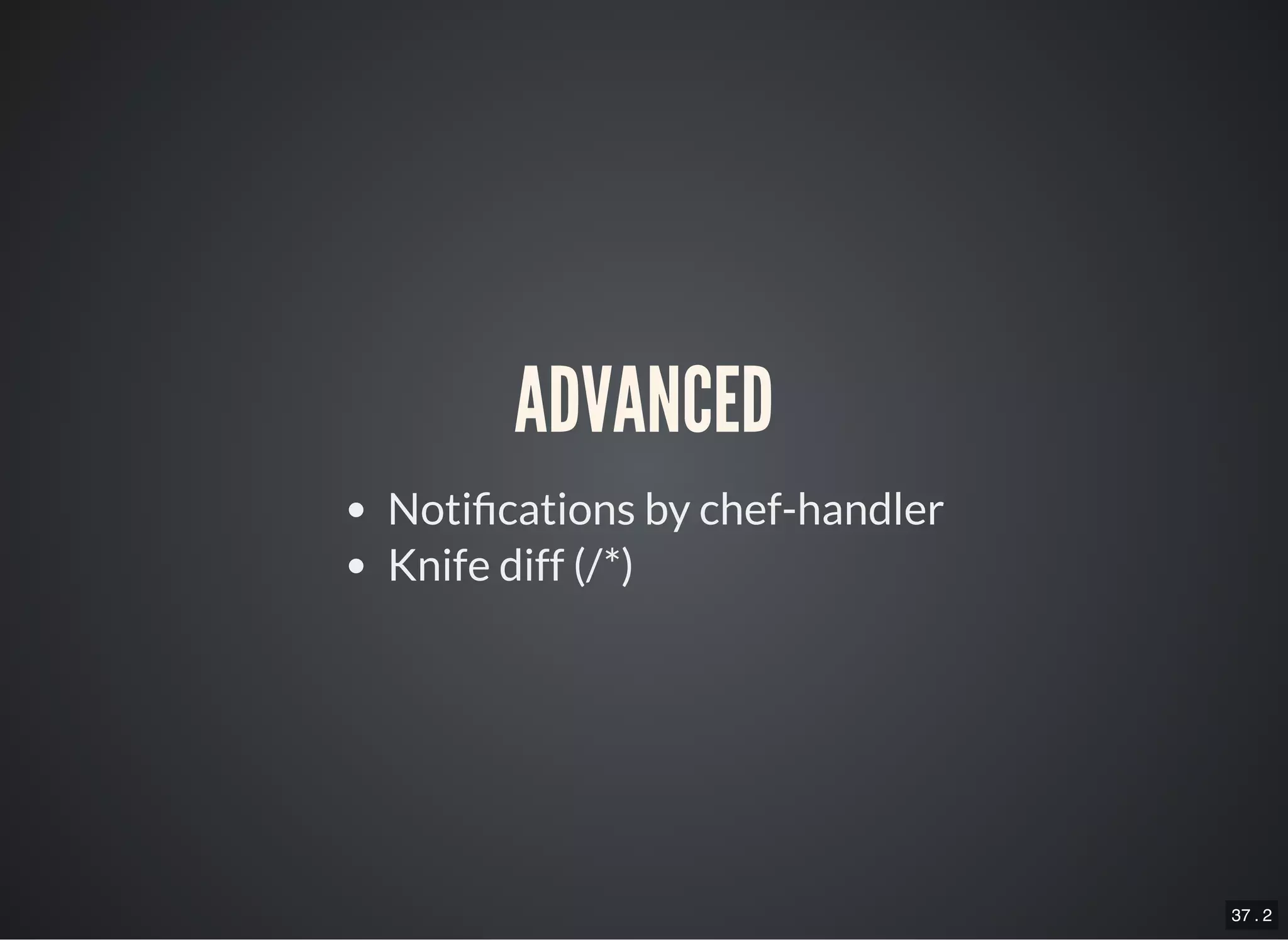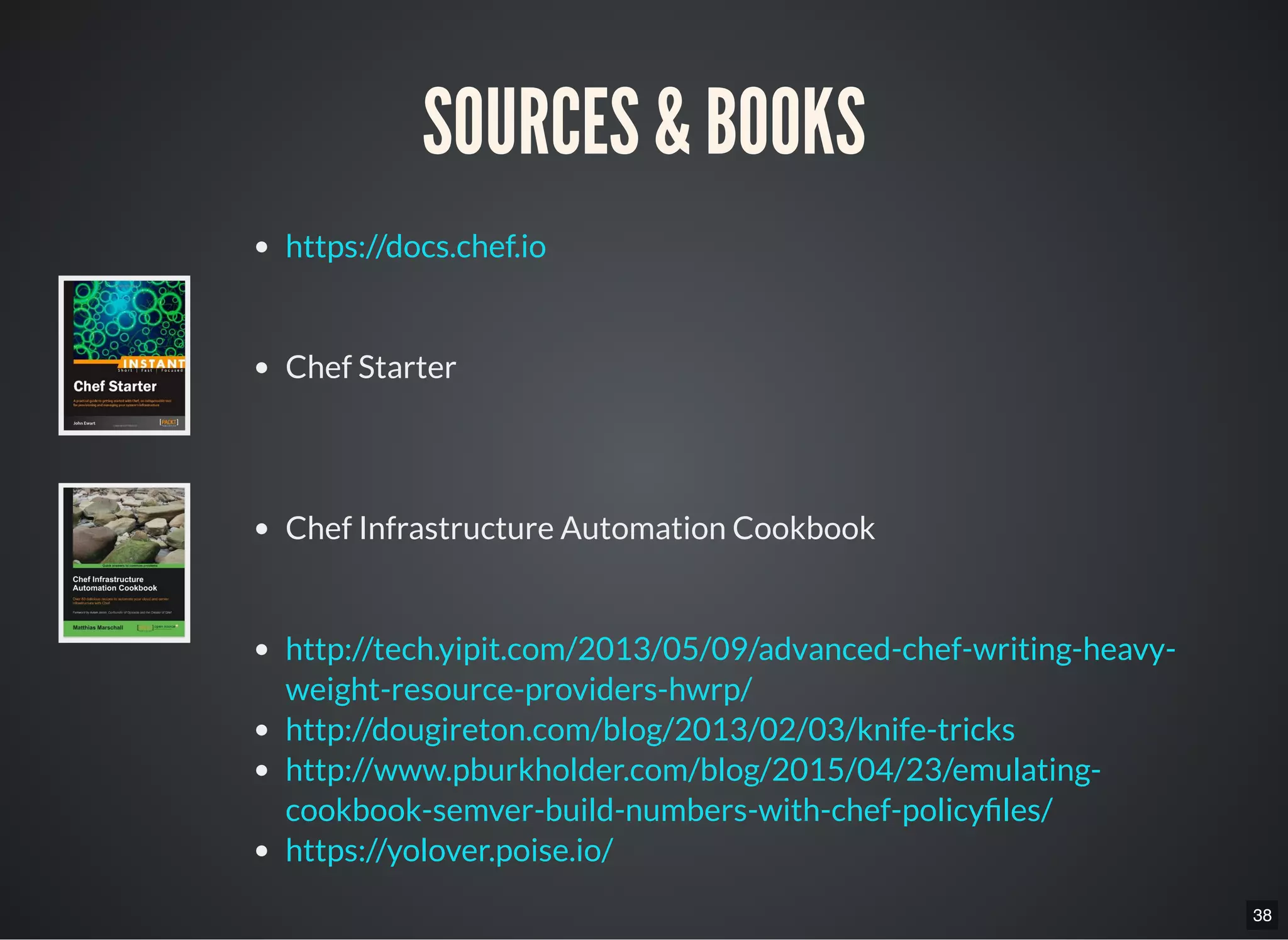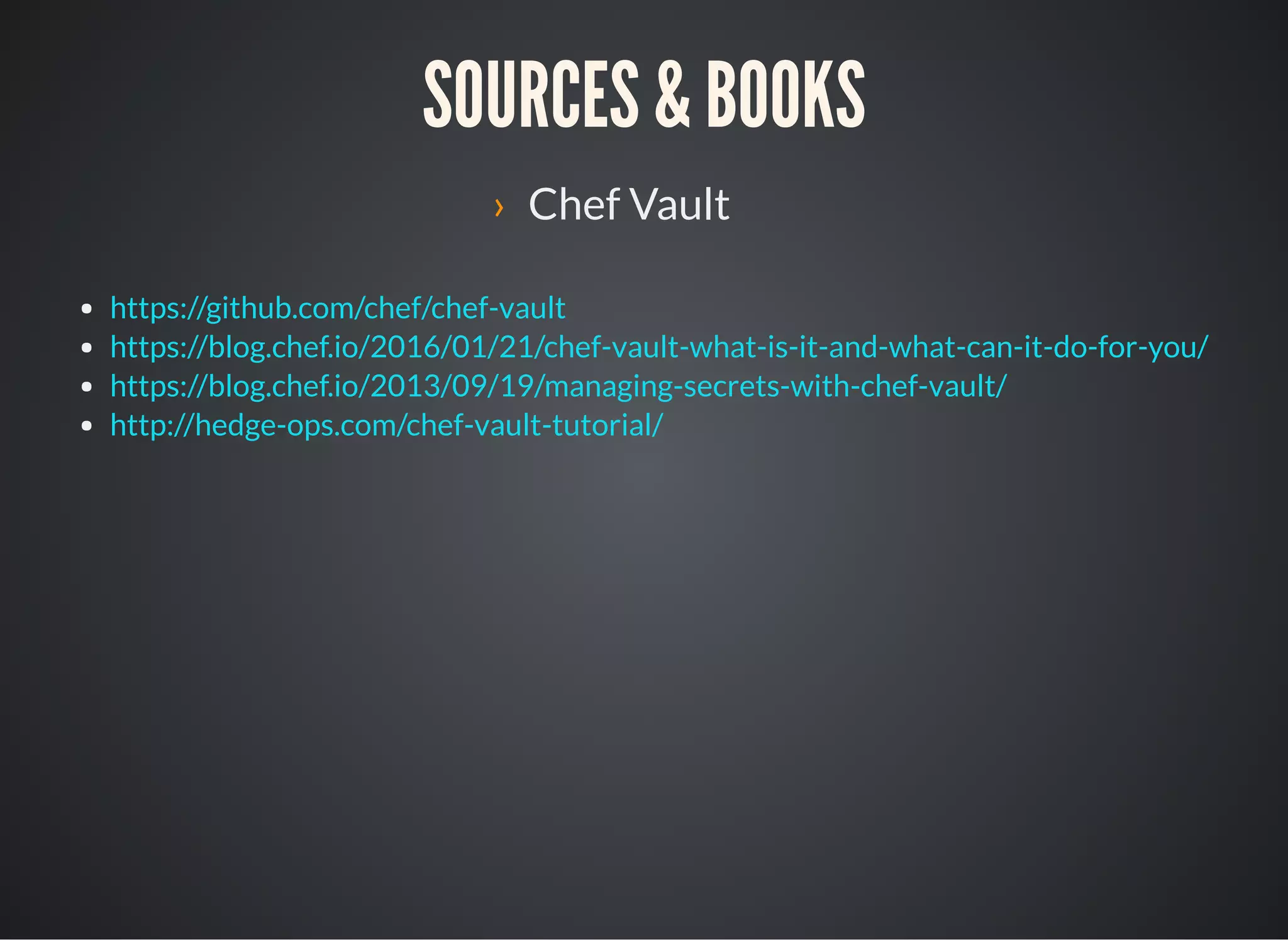This document compares configuration management tools Puppet, Ansible, and Chef. It discusses their approaches, languages, stored data formats, use of agents, and provides examples of configuration in each. Chef uses Ruby and JSON files, supports hierarchical execution and searching, and can run with or without a server. Puppet uses Ruby, YAML files and dependency-based configuration. Ansible is agentless and uses YAML files and Python plugins.
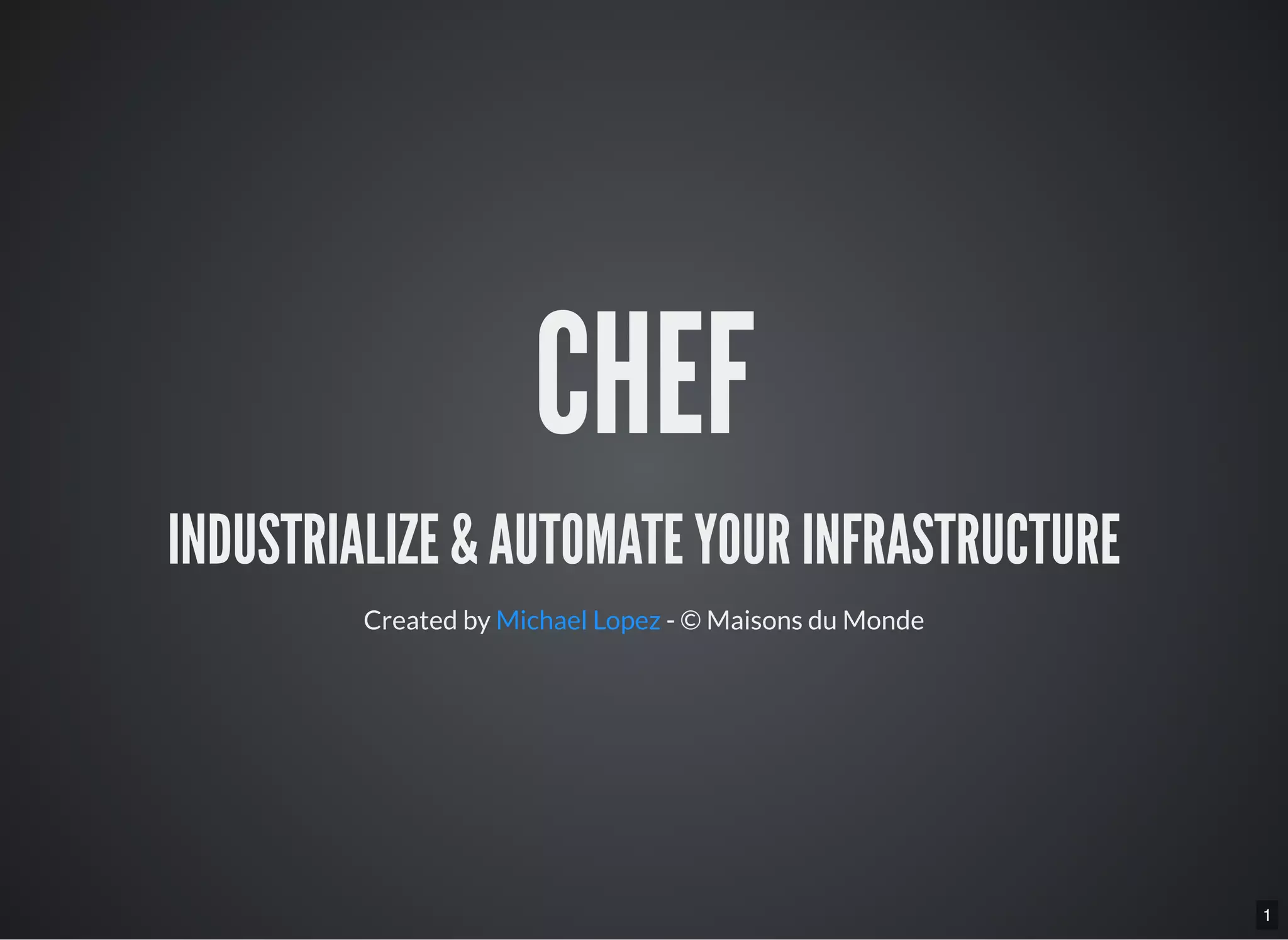
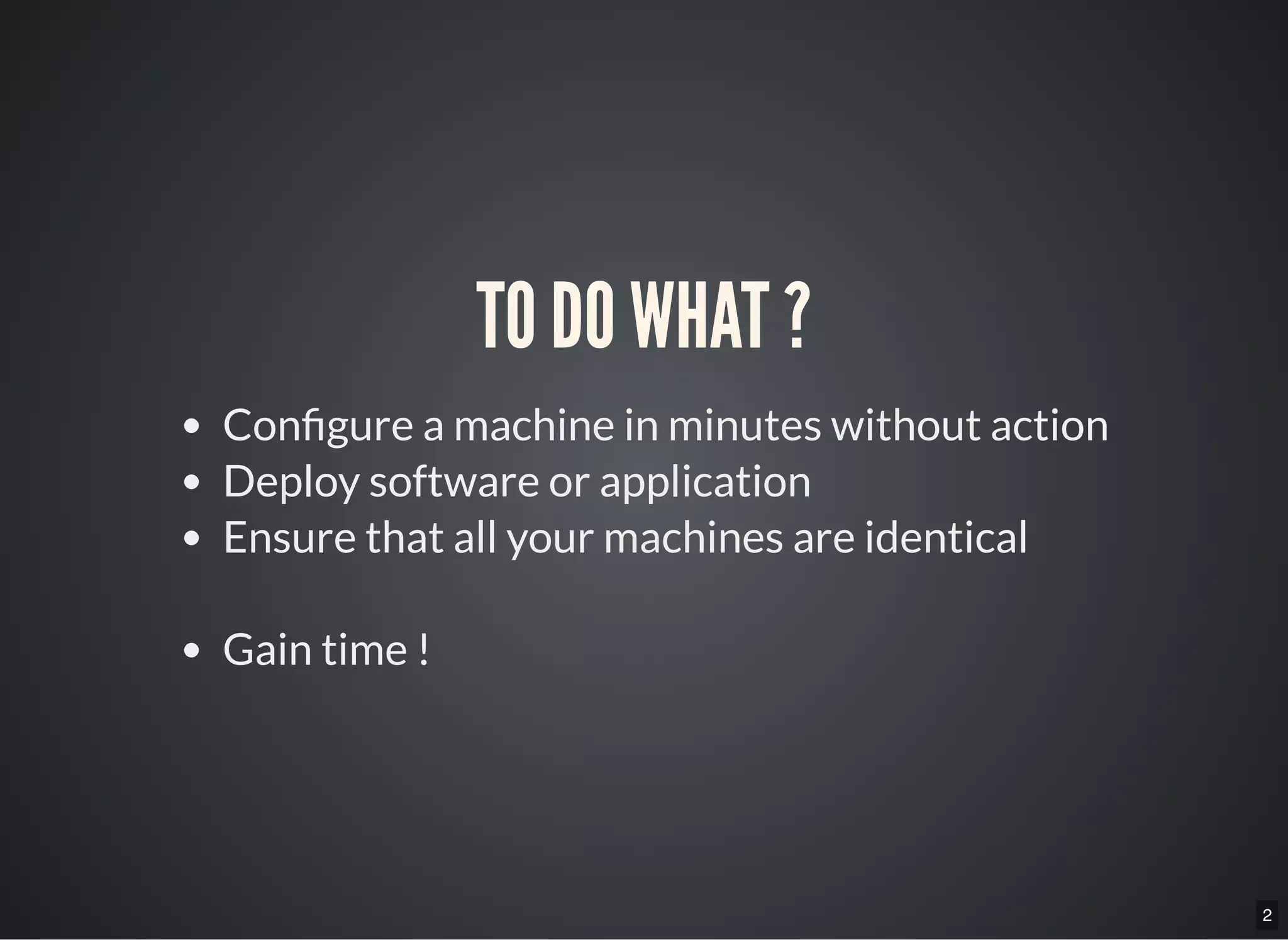
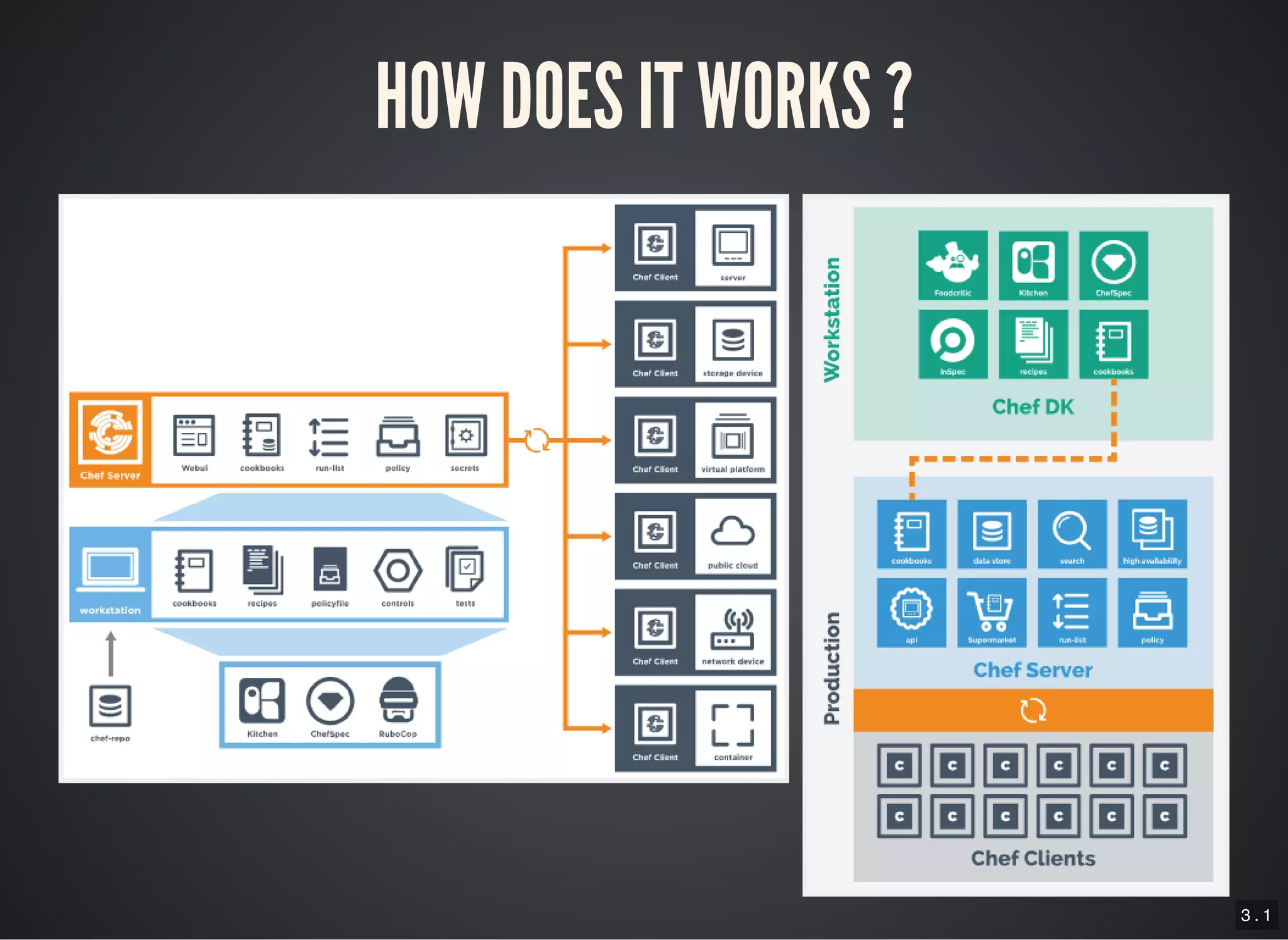
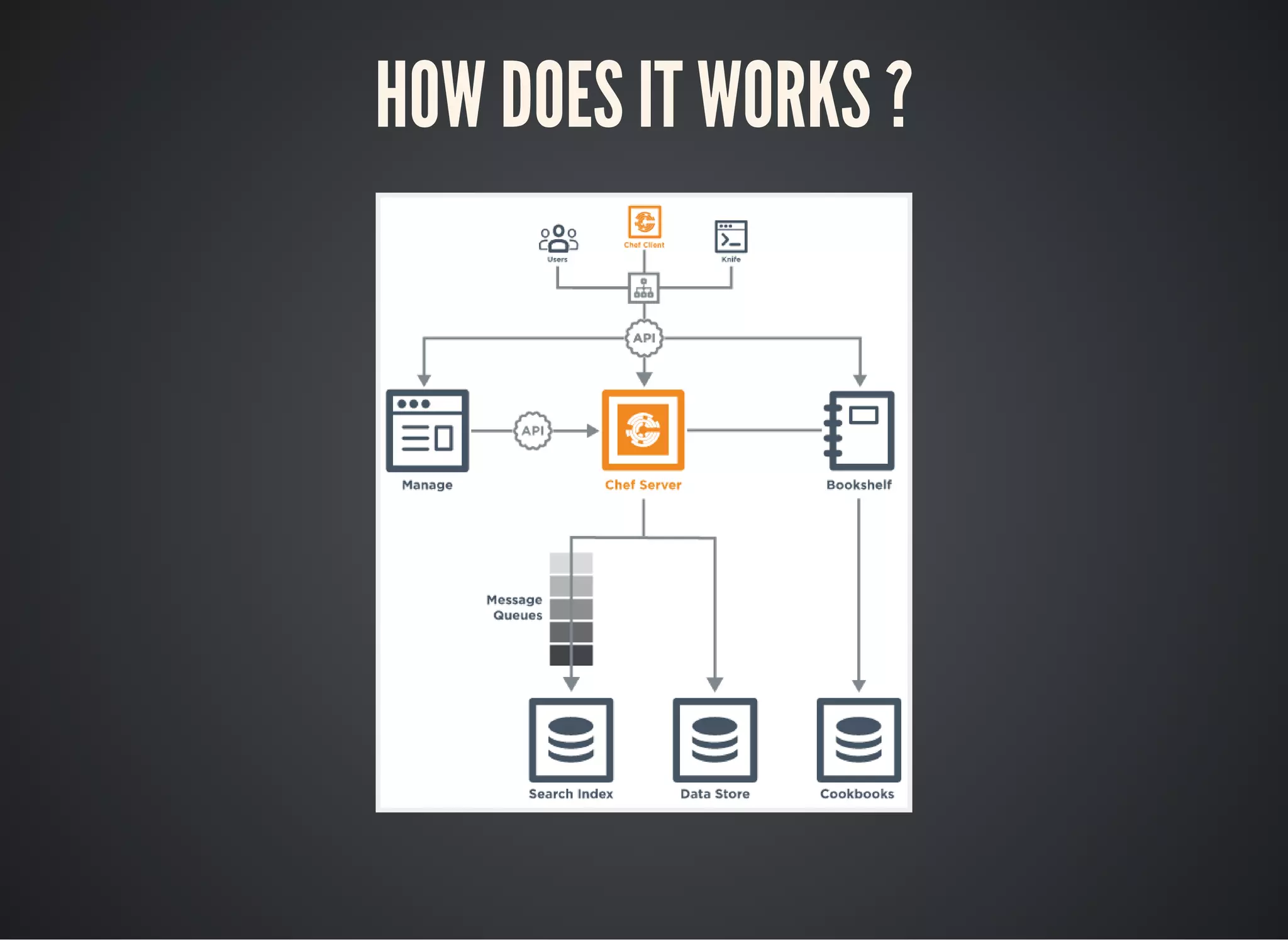
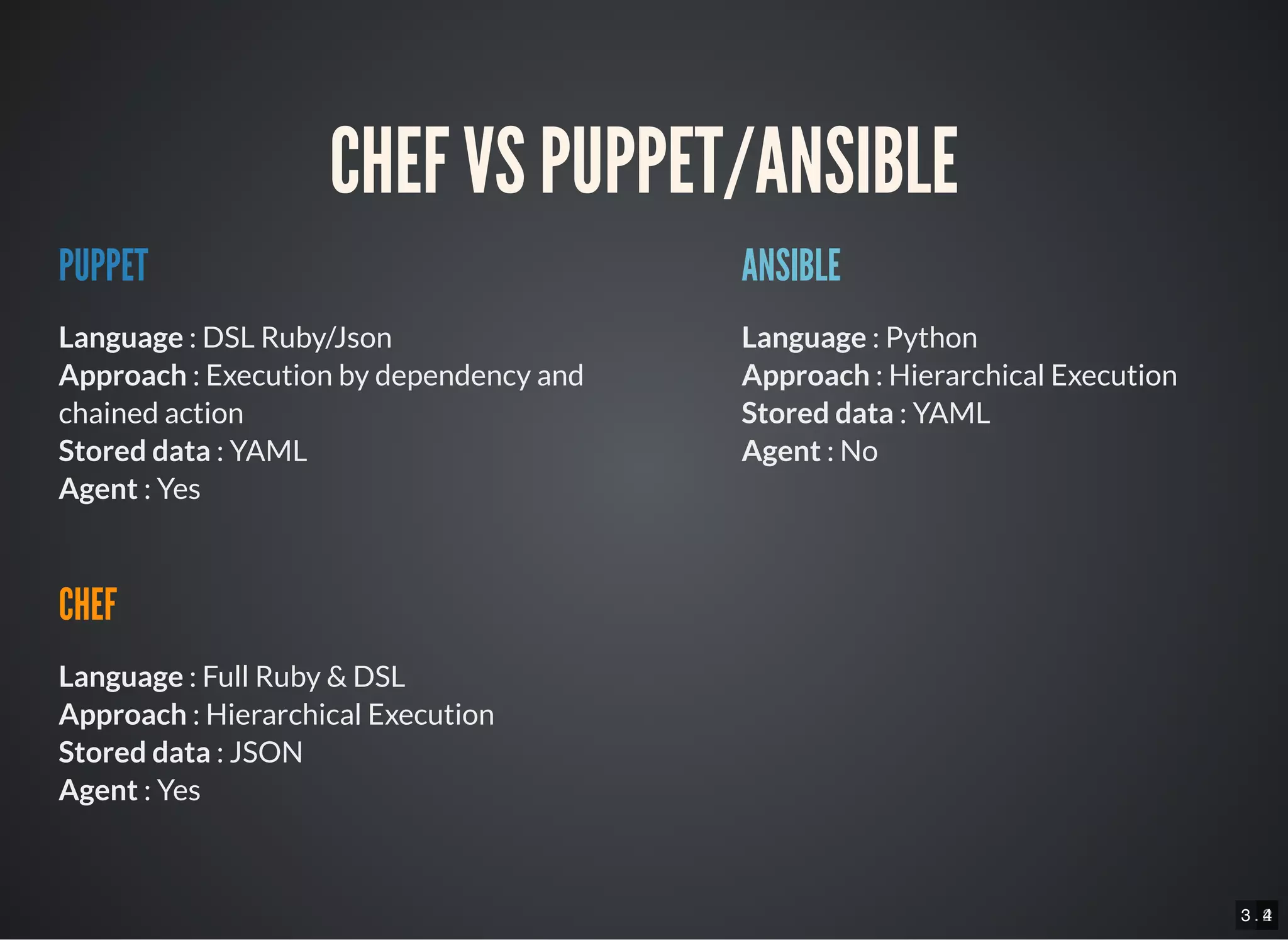
![PUPPET
package { 'openssh-server':
ensure => present,
before => File['/etc/ssh/sshd_config'],
}
file { '/etc/ssh/sshd_config':
ensure => file,
mode => 600,
source => 'puppet:///modules/sshd/sshd_config',
require => Package['openssh-server'],
}
service { 'sshd':
ensure => running,
enable => true,
subscribe => File['/etc/ssh/sshd_config'],
}](https://image.slidesharecdn.com/chef-industrializeandautomateyourinfrastructure-170207093453/75/Chef-industrialize-and-automate-your-infrastructure-6-2048.jpg)
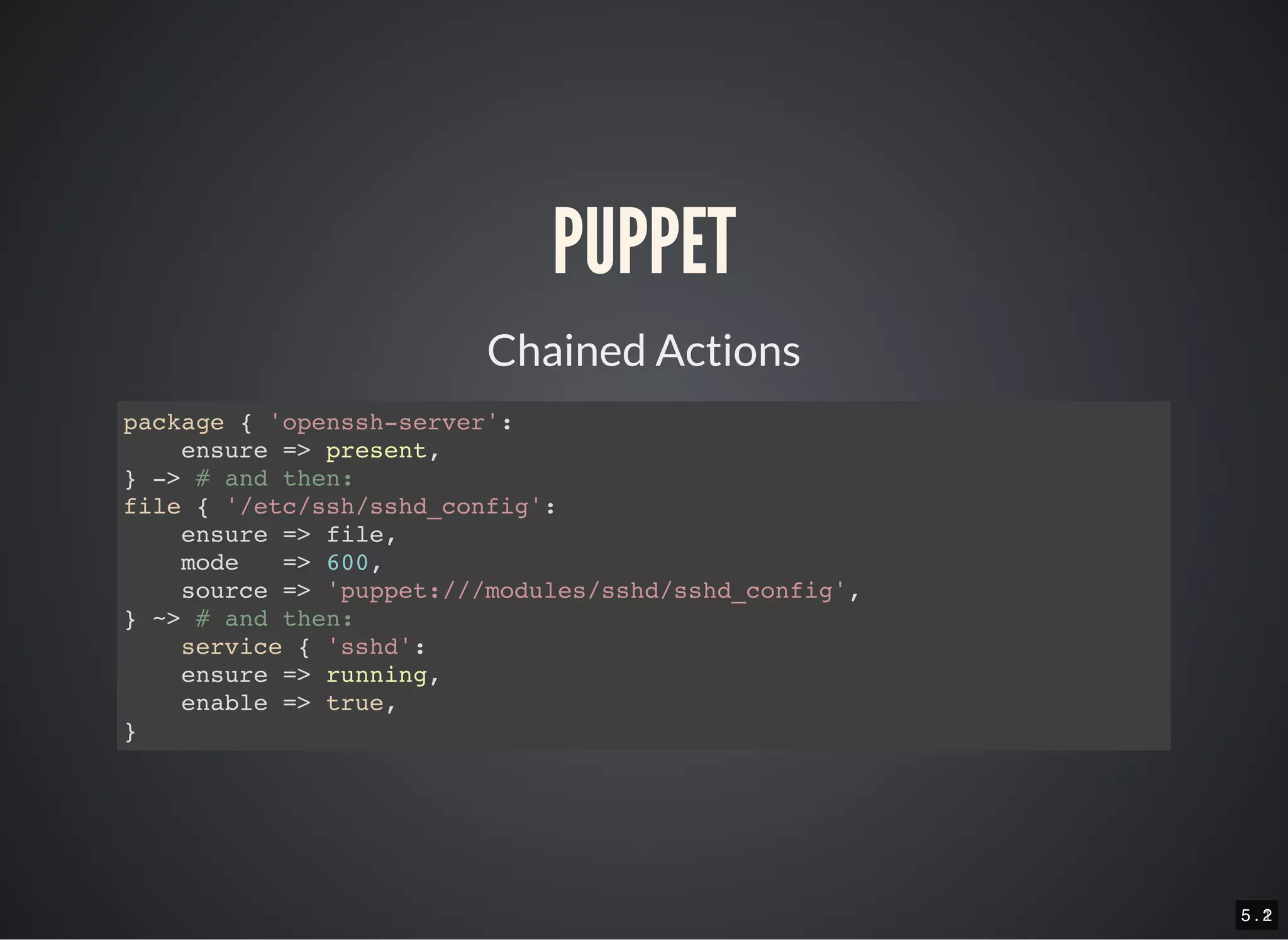
![5 . 3
PUPPET
Virtual Resources
@user {'deploy':
uid => 2004,
comment => 'Deployment User',
group => www-data,
groups => ["enterprise"],
tag => [deploy, web],
}
realize User['deploy'], User['zleslie']
User <| tag == web |>](https://image.slidesharecdn.com/chef-industrializeandautomateyourinfrastructure-170207093453/75/Chef-industrialize-and-automate-your-infrastructure-8-2048.jpg)
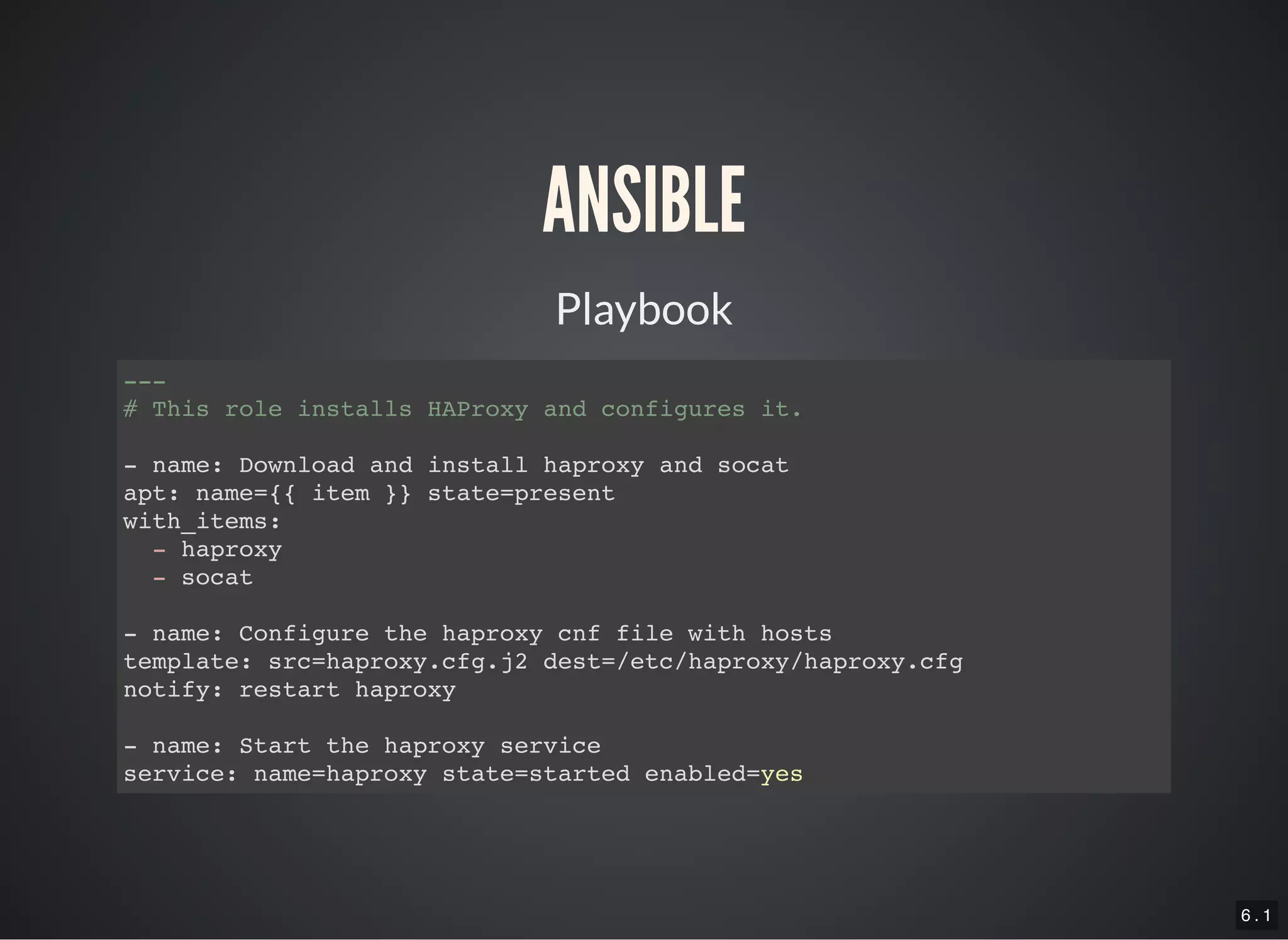
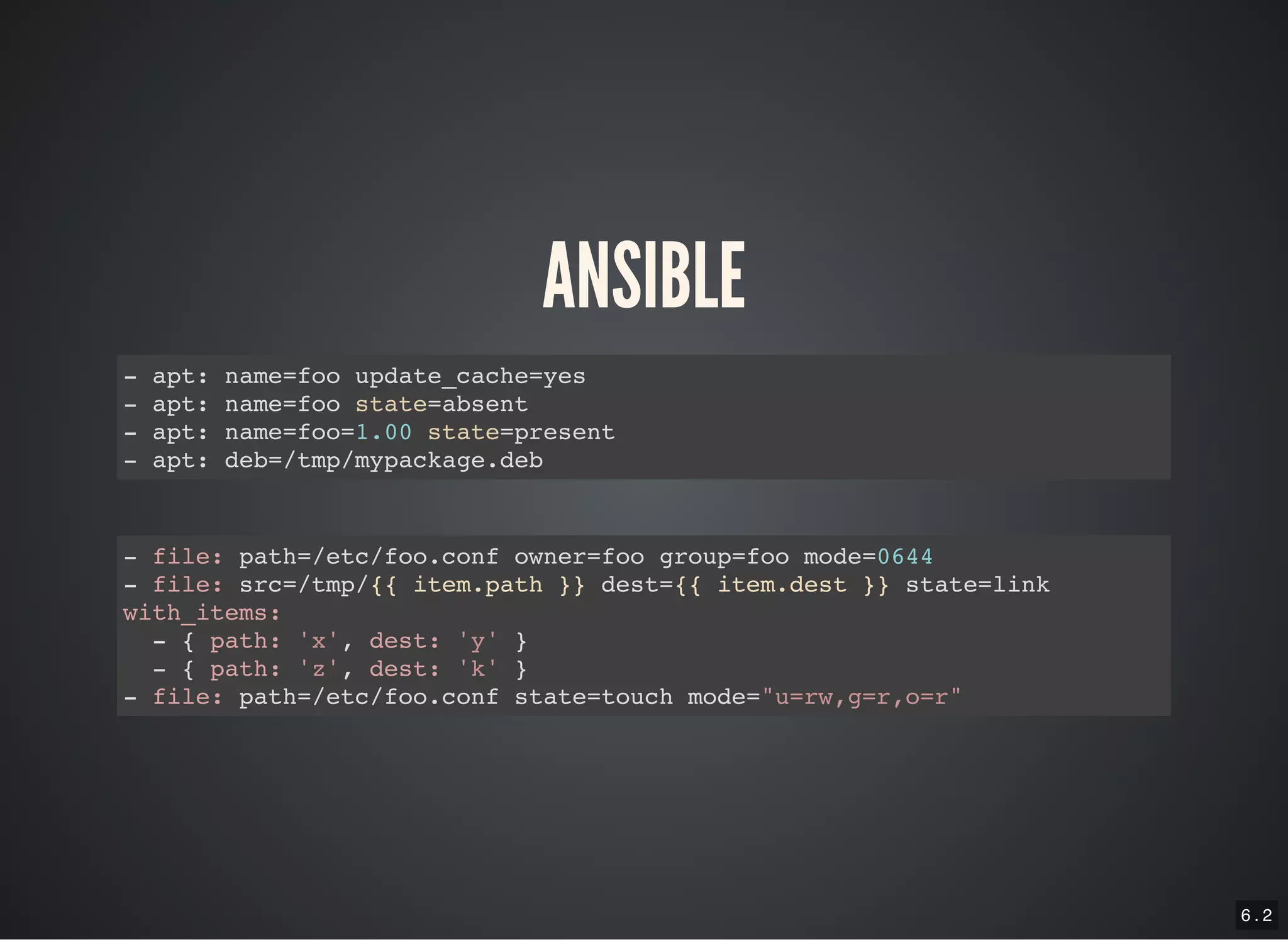
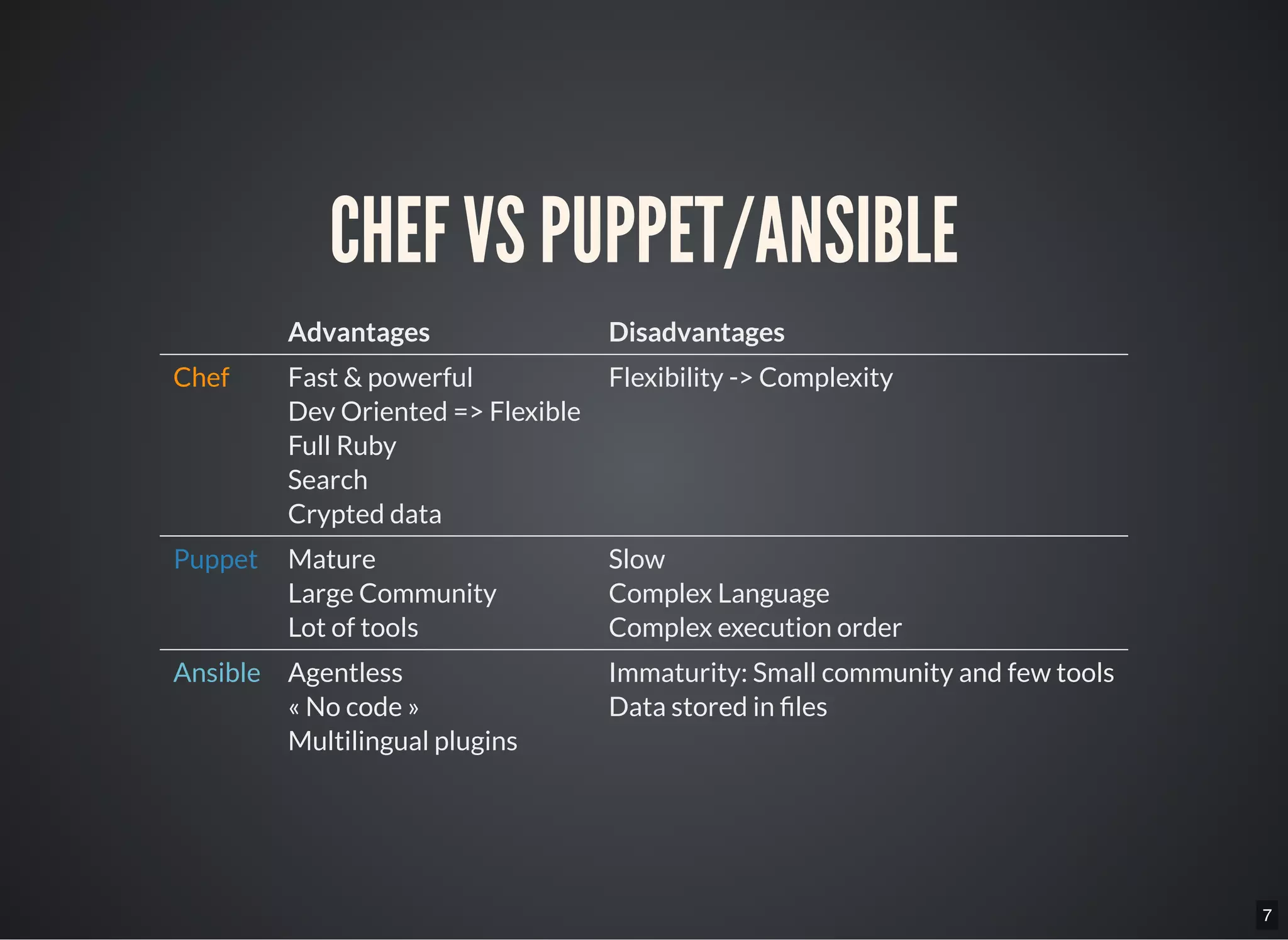
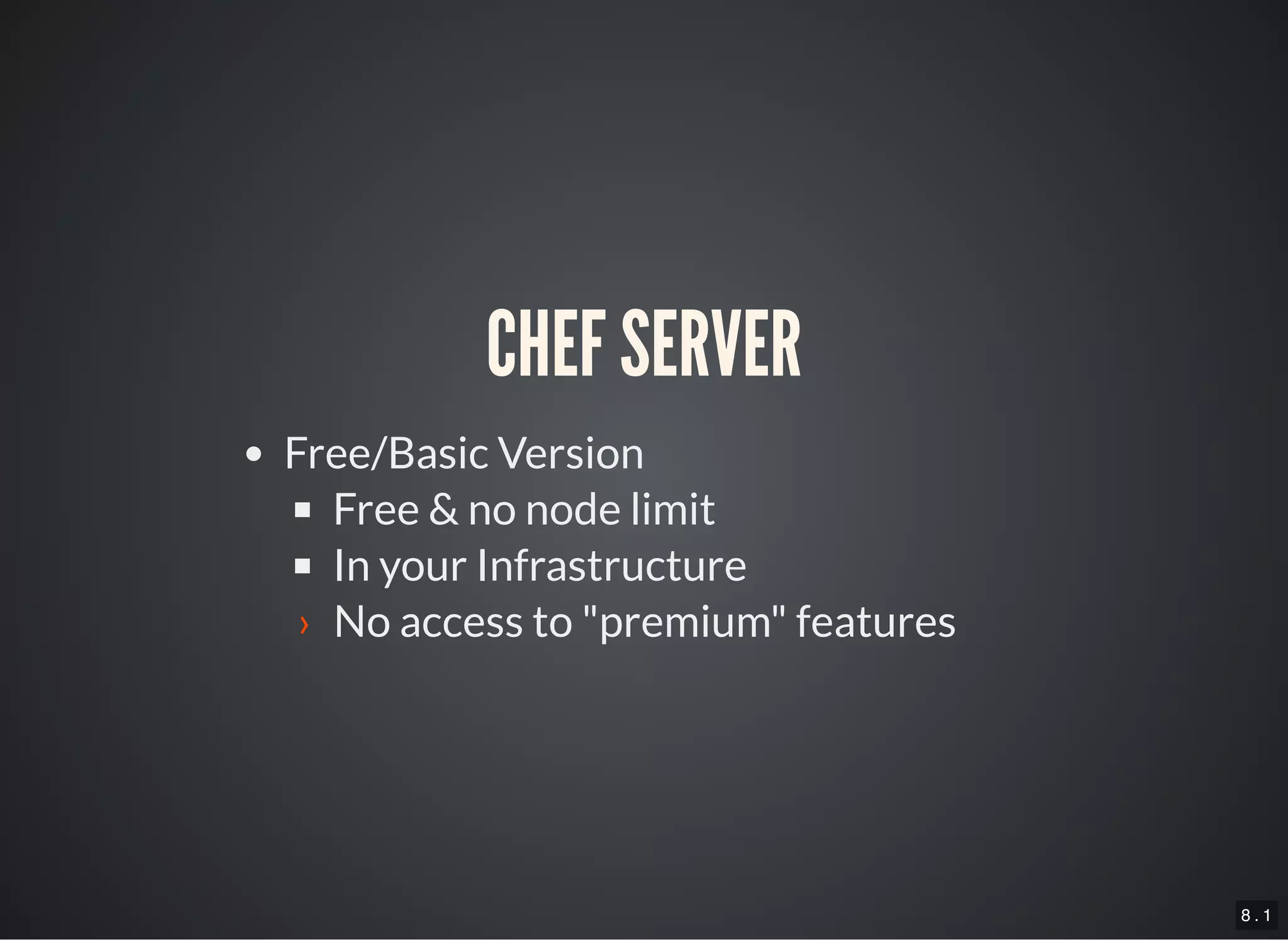
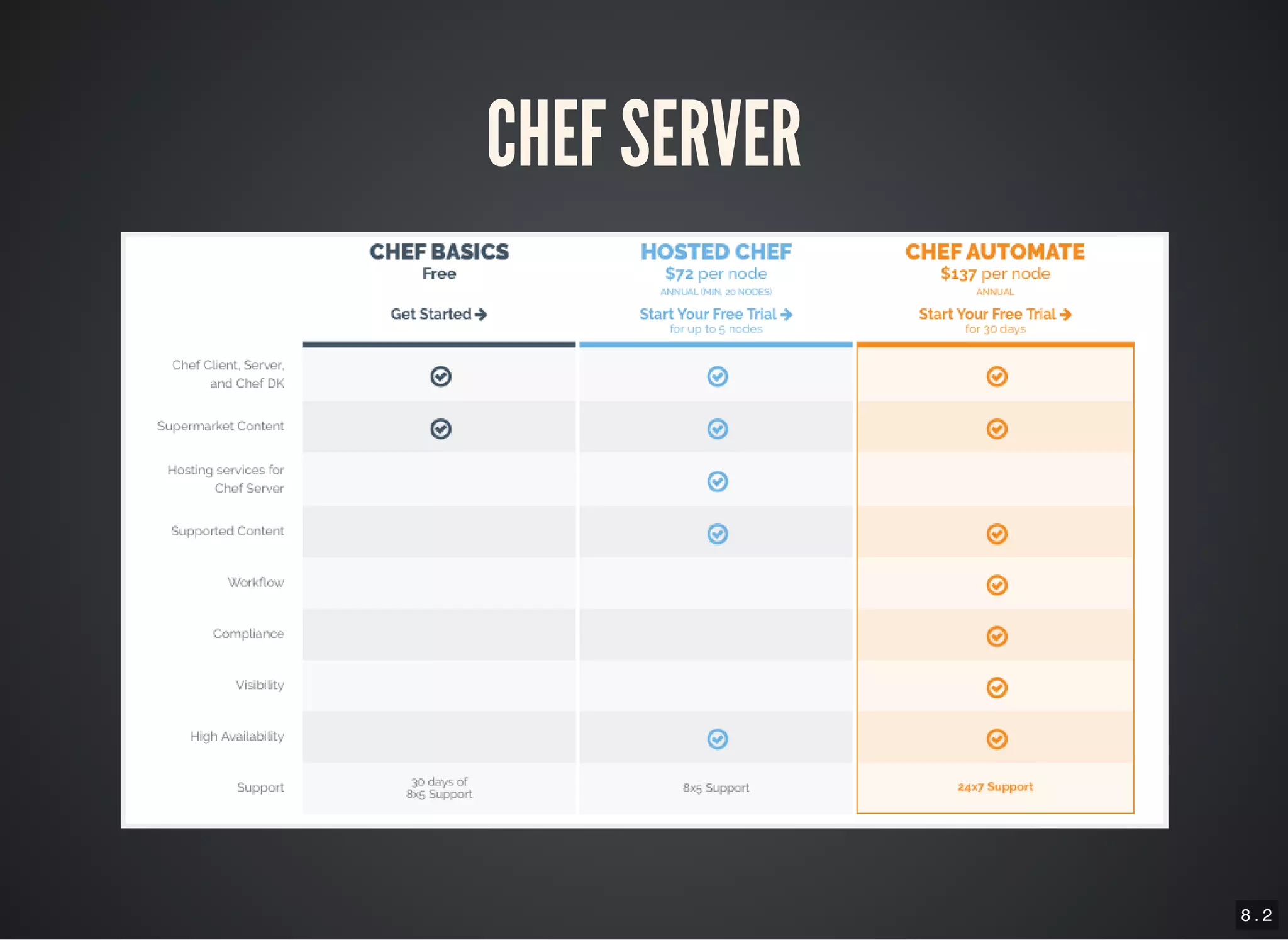
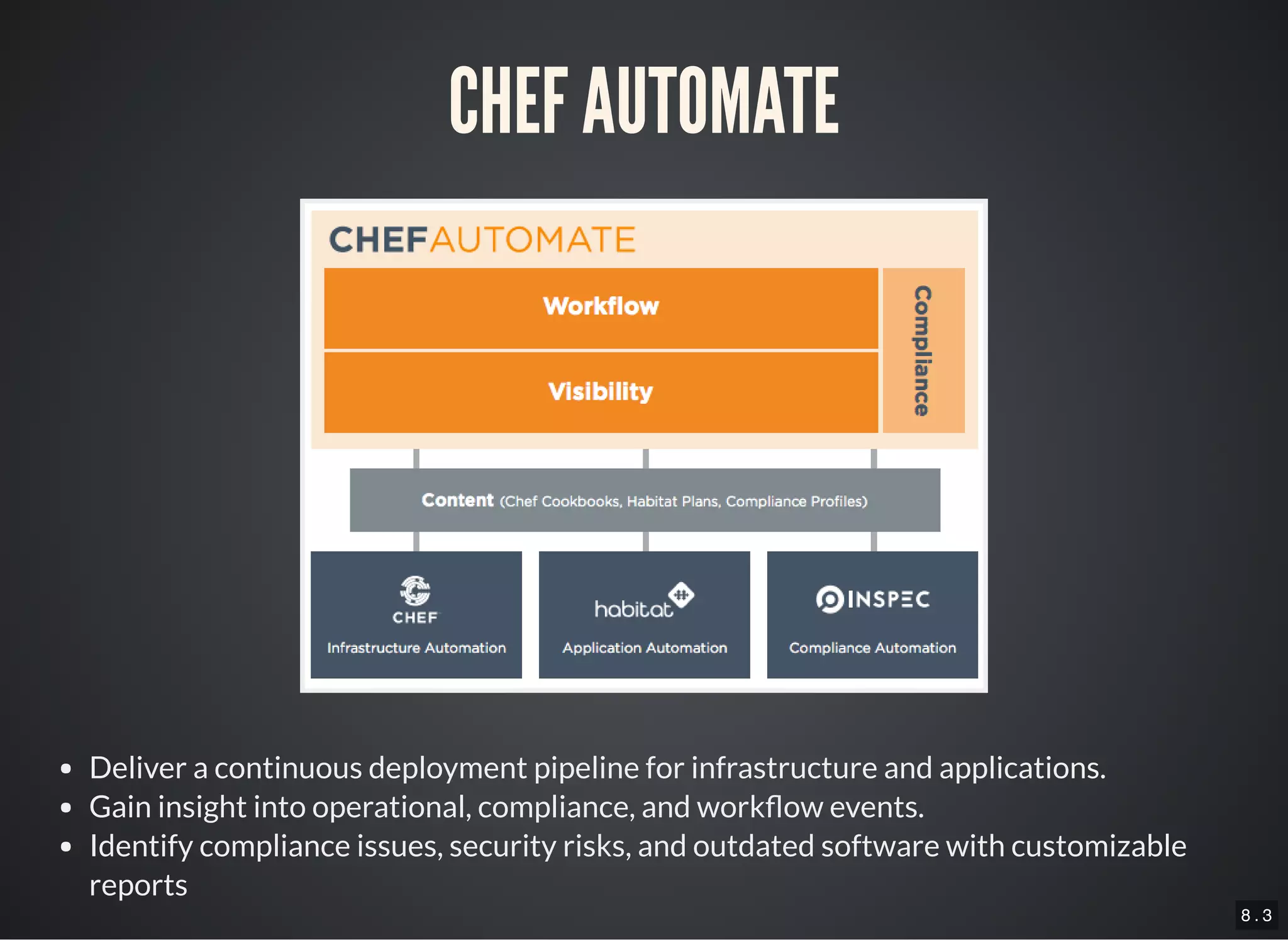
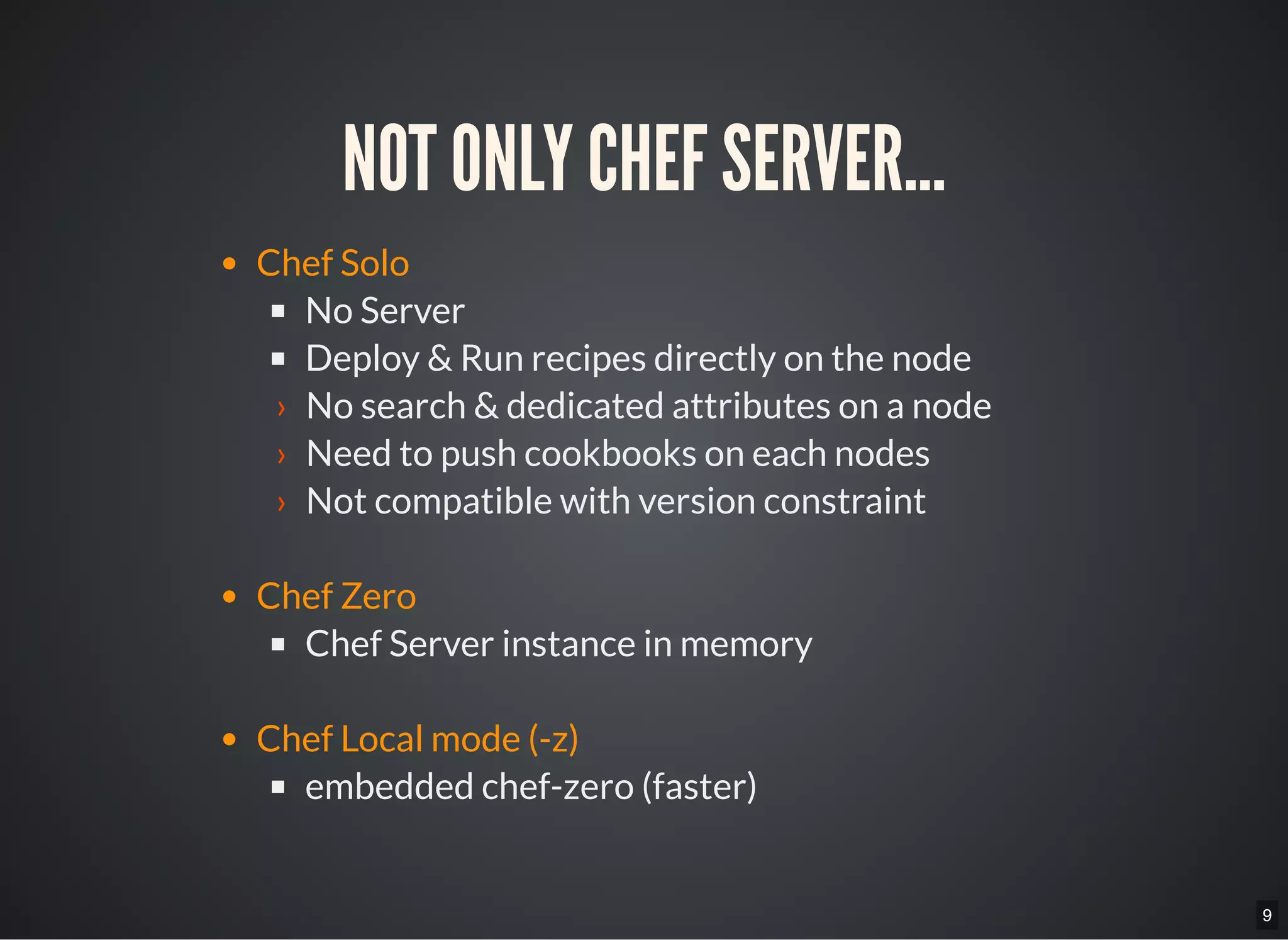
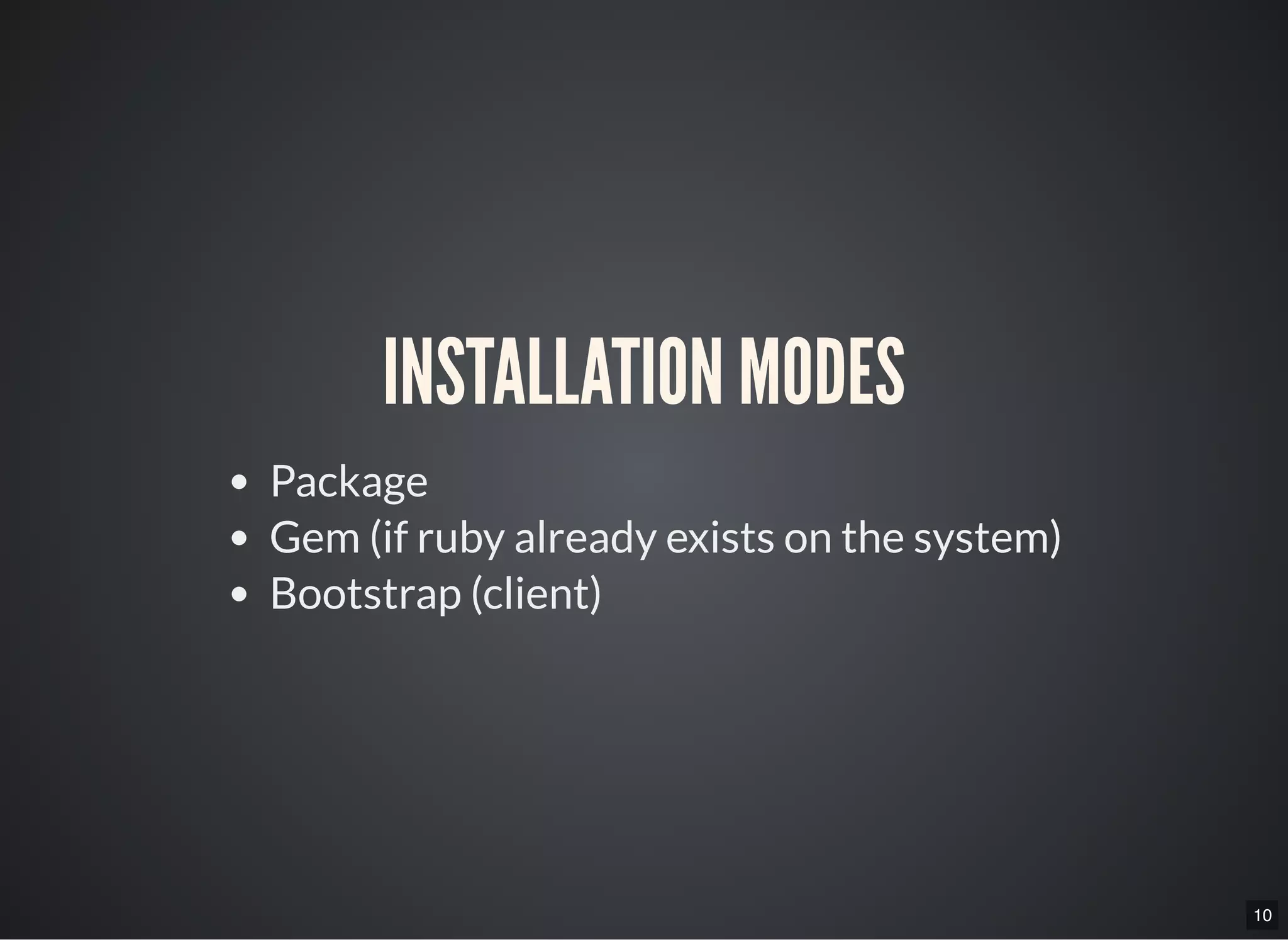
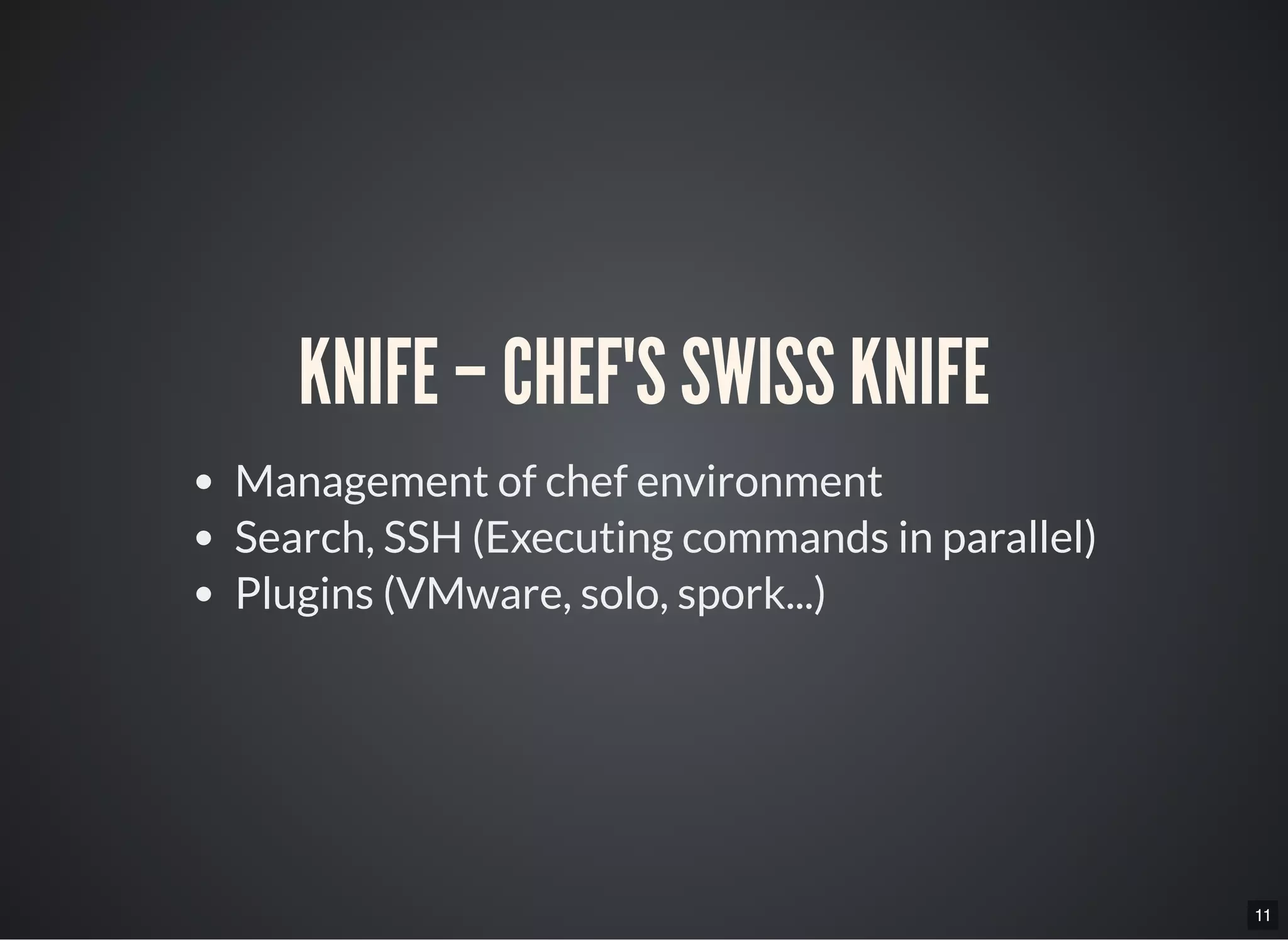
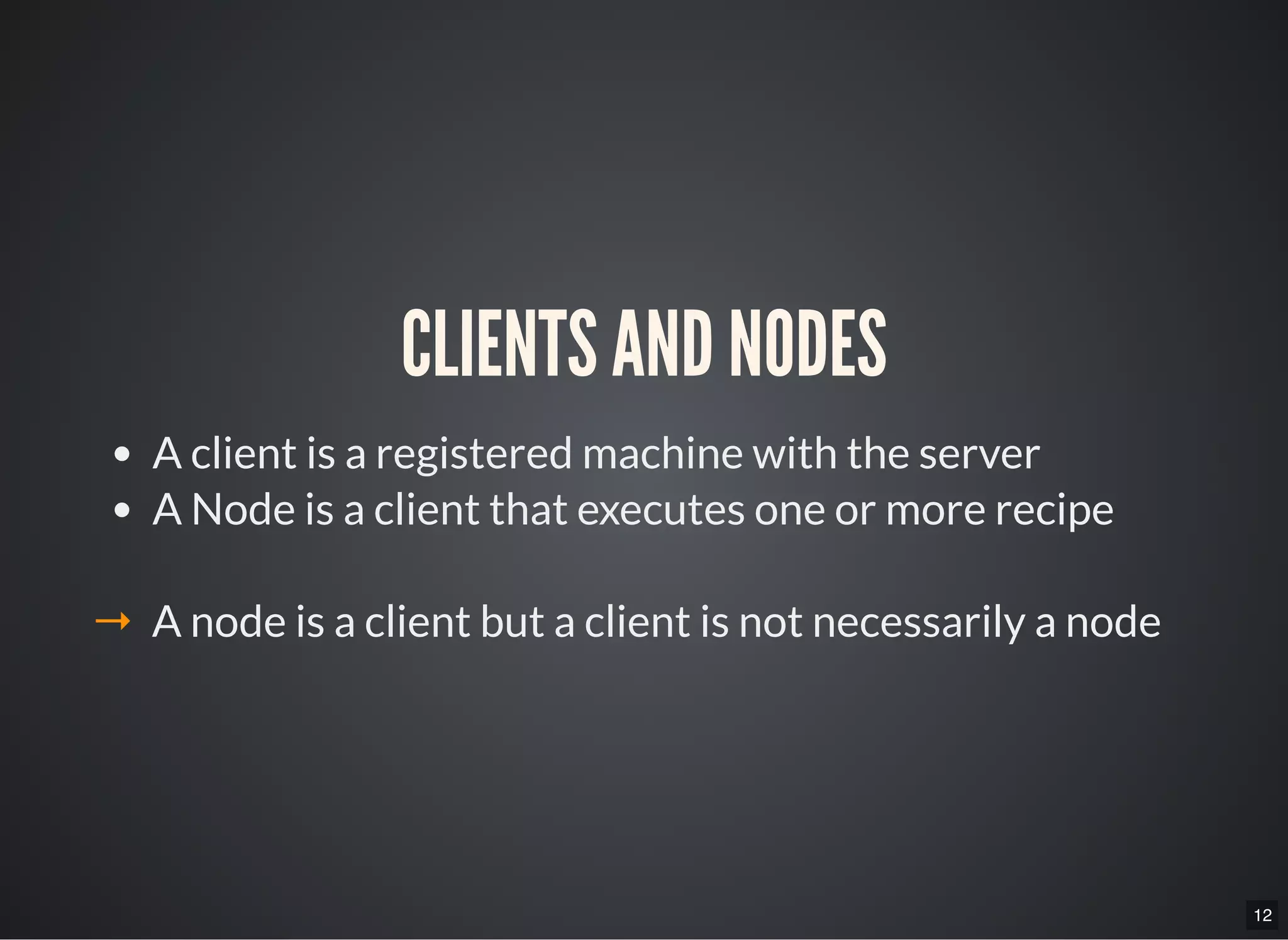
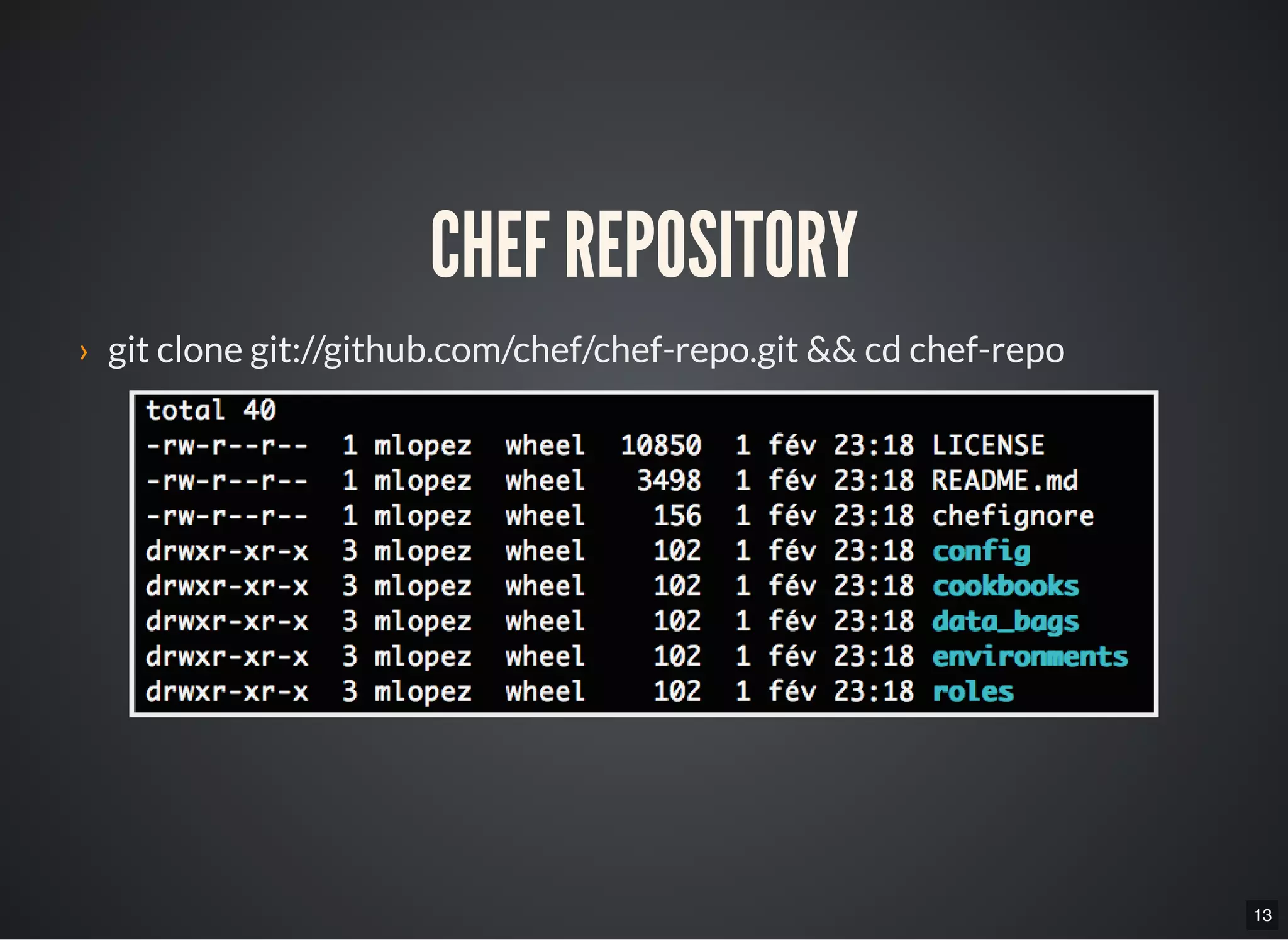
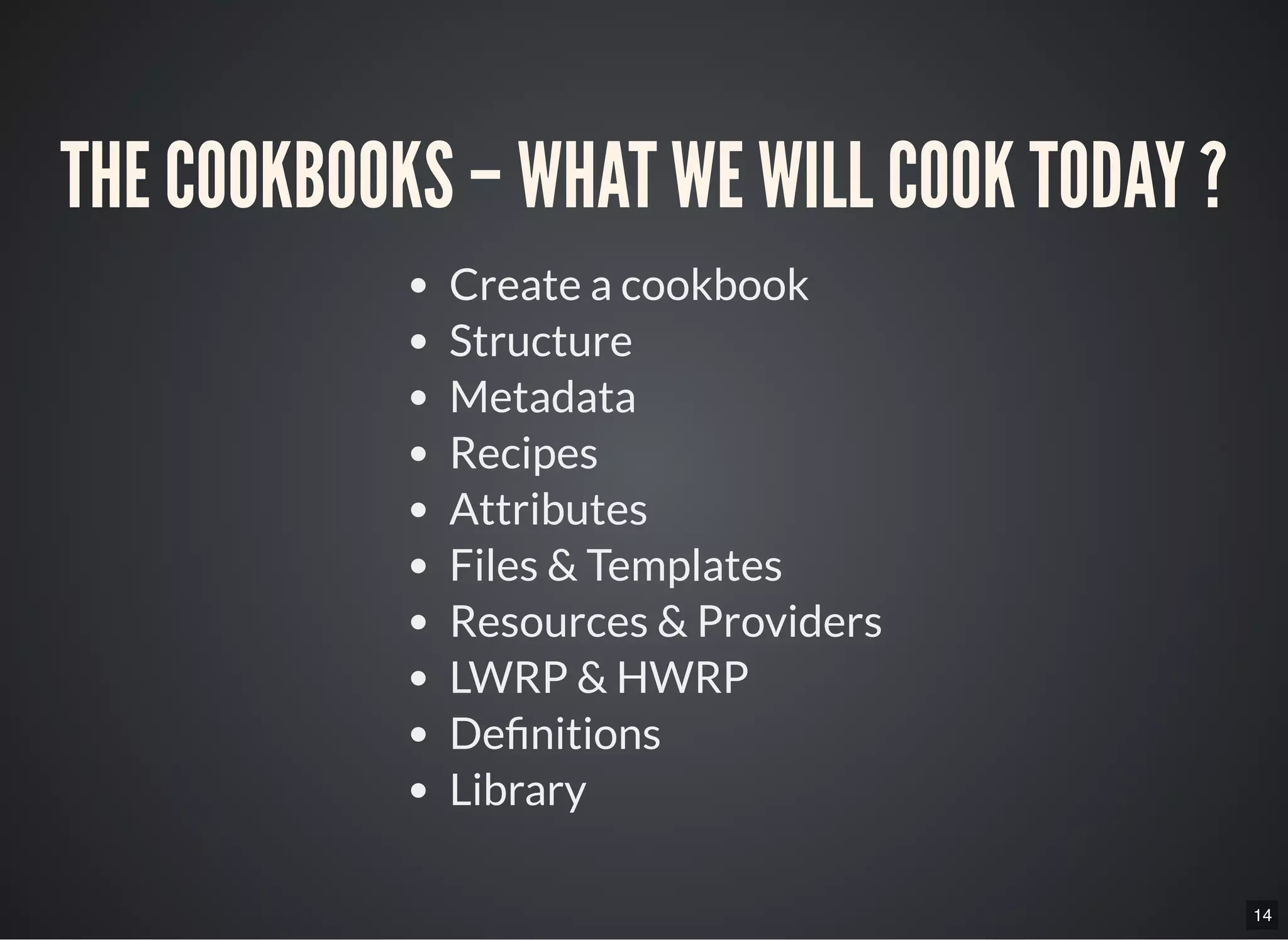
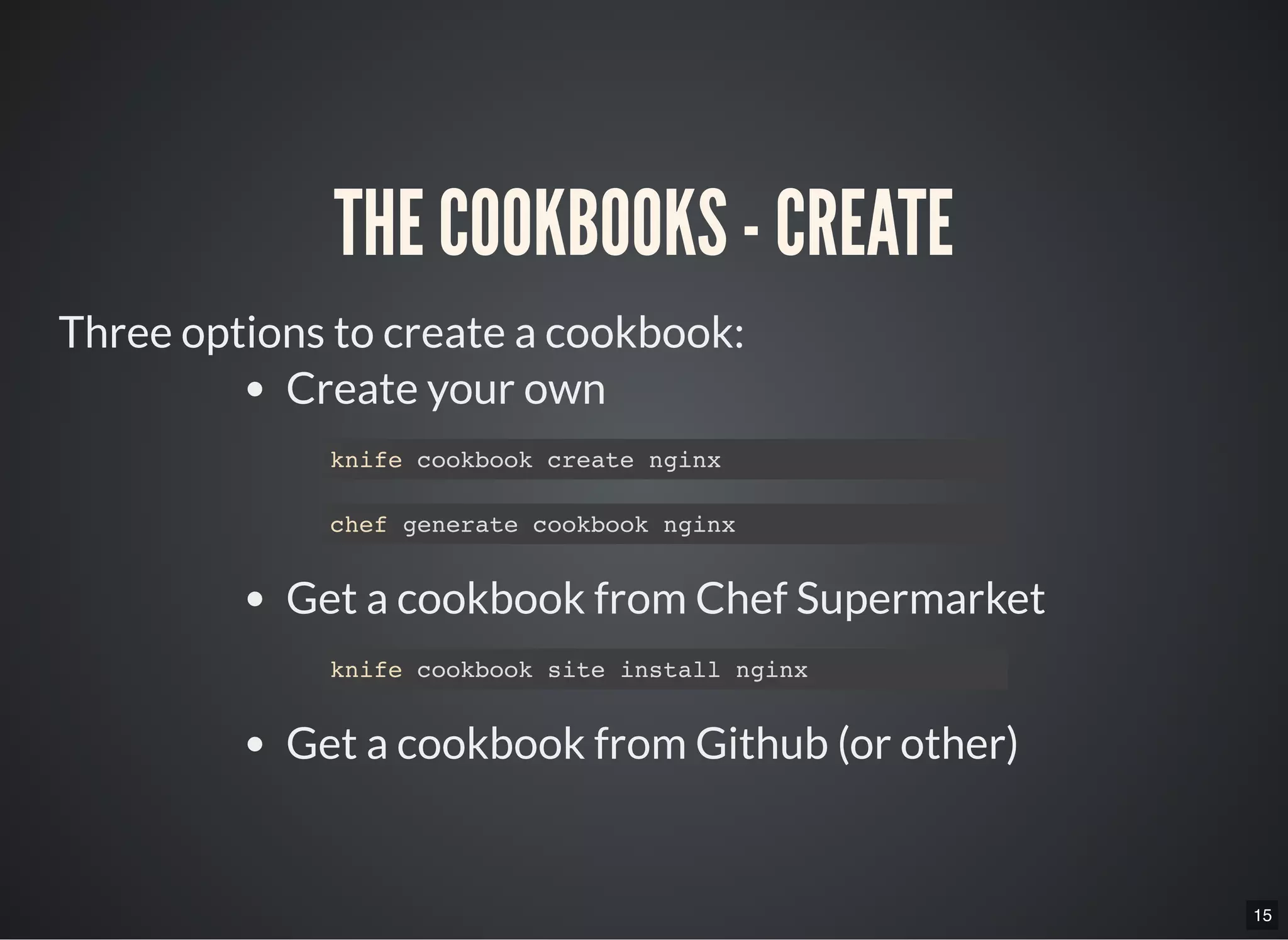
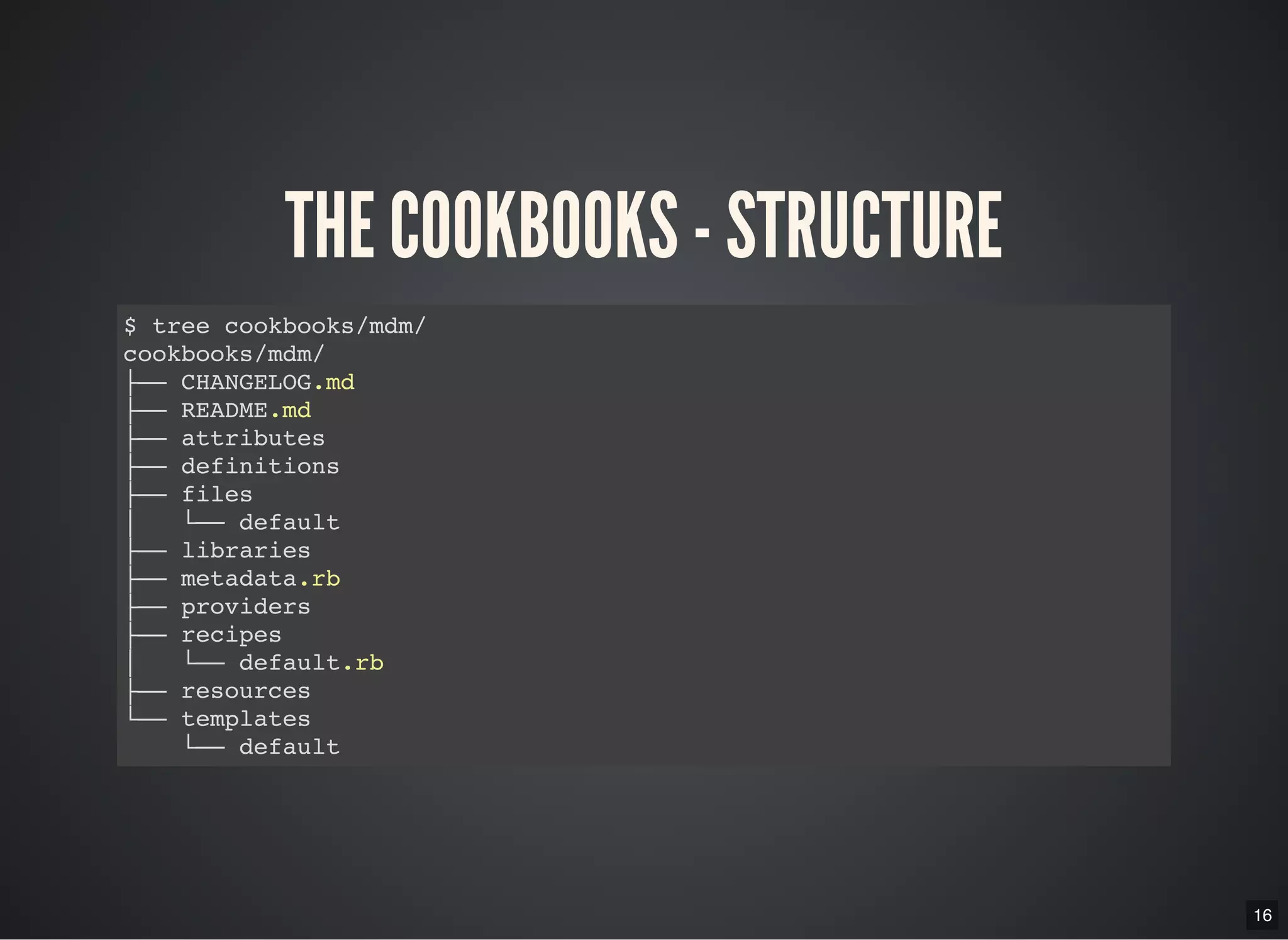
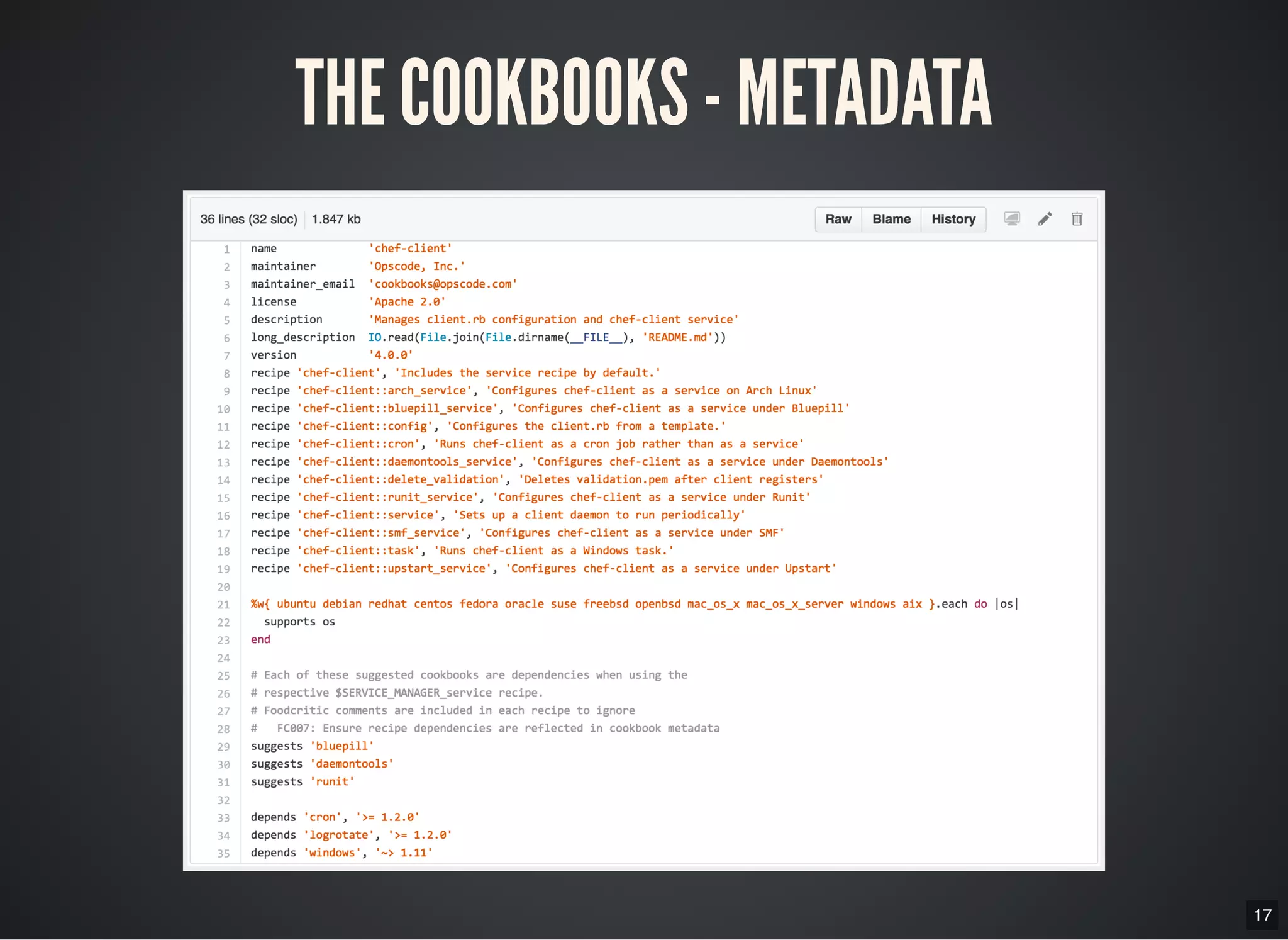
![18
THE COOKBOOKS - RECIPES
› cookbook/elasticsearch/recipes/default.rb
include_recipe 'java'
include_recipe 'elasticsearch::repo'
include_recipe 'elasticsearch::sysctl'
package 'elasticsearch'
template '/etc/default/elasticsearch' do
source 'elasticsearch.default.erb'
owner 'root'
group 'root'
mode 0644
notifies :restart, 'service[elasticsearch]', :delayed
end
template node[:elasticsearch][:conf_file] do
source 'elasticsearch.yml.erb'
owner 'root'
group 'root'
mode 0644
notifies :restart, 'service[elasticsearch]', :delayed
end
include_recipe 'elasticsearch::plugins'
service 'elasticsearch' do
supports :status => true, :restart => true
action [:enable, :start]
end
› cookbook/elasticsearch/recipes/repo.rb apt_repository "elasticsearch" do
uri "http://packages.elasticsearch.org/elasticsearch/1.4/debian"
distribution "stable"
components ['main']
arch "amd64"
key "https://packages.elasticsearch.org/GPG-KEY-elasticsearch"
action :add
end](https://image.slidesharecdn.com/chef-industrializeandautomateyourinfrastructure-170207093453/75/Chef-industrialize-and-automate-your-infrastructure-24-2048.jpg)
![19 . 1
THE COOKBOOKS - ATTRIBUTES
› memcache/attributes/default.rb
default['memcached']['memory'] = 64
default['memcached']['port'] = 11211
default['memcached']['udp_port'] = 11211
default['memcached']['listen'] = '0.0.0.0'
default['memcached']['maxconn'] = 1024
default['memcached']['max_object_size'] = '1m'
default['memcached']['logfilename'] = 'memcached.log'
case node['platform_family']
when 'ubuntu'
default['memcached']['user'] = 'memcache'
default['memcached']['group'] = 'memcache'
when 'debian'
default['memcached']['user'] = 'nobody'
default['memcached']['group'] = 'nogroup'
else
default['memcached']['user'] = 'nobody'
default['memcached']['user'] = 'nogroup'
end](https://image.slidesharecdn.com/chef-industrializeandautomateyourinfrastructure-170207093453/75/Chef-industrialize-and-automate-your-infrastructure-25-2048.jpg)
![19 . 2
THE COOKBOOKS - ATTRIBUTES
case node['platform']
when "debian"
case
when node['platform_version'].to_f < 6.0 # All 5.X
default['postgresql']['version'] = "8.3"
when node['platform_version'].to_f < 7.0 # All 6.X
default['postgresql']['version'] = "8.4"
else
default['postgresql']['version'] = "9.1"
end
default['postgresql']['client']['packages'] = ["postgresql-client-#{node['postgresql']['version']}","libpq-dev"]
default['postgresql']['server']['packages'] = ["postgresql-#{node['postgresql']['version']}"]
default['postgresql']['contrib']['packages'] = ["postgresql-contrib-#{node['postgresql']['version']}"]
when "fedora"
...](https://image.slidesharecdn.com/chef-industrializeandautomateyourinfrastructure-170207093453/75/Chef-industrialize-and-automate-your-infrastructure-26-2048.jpg)
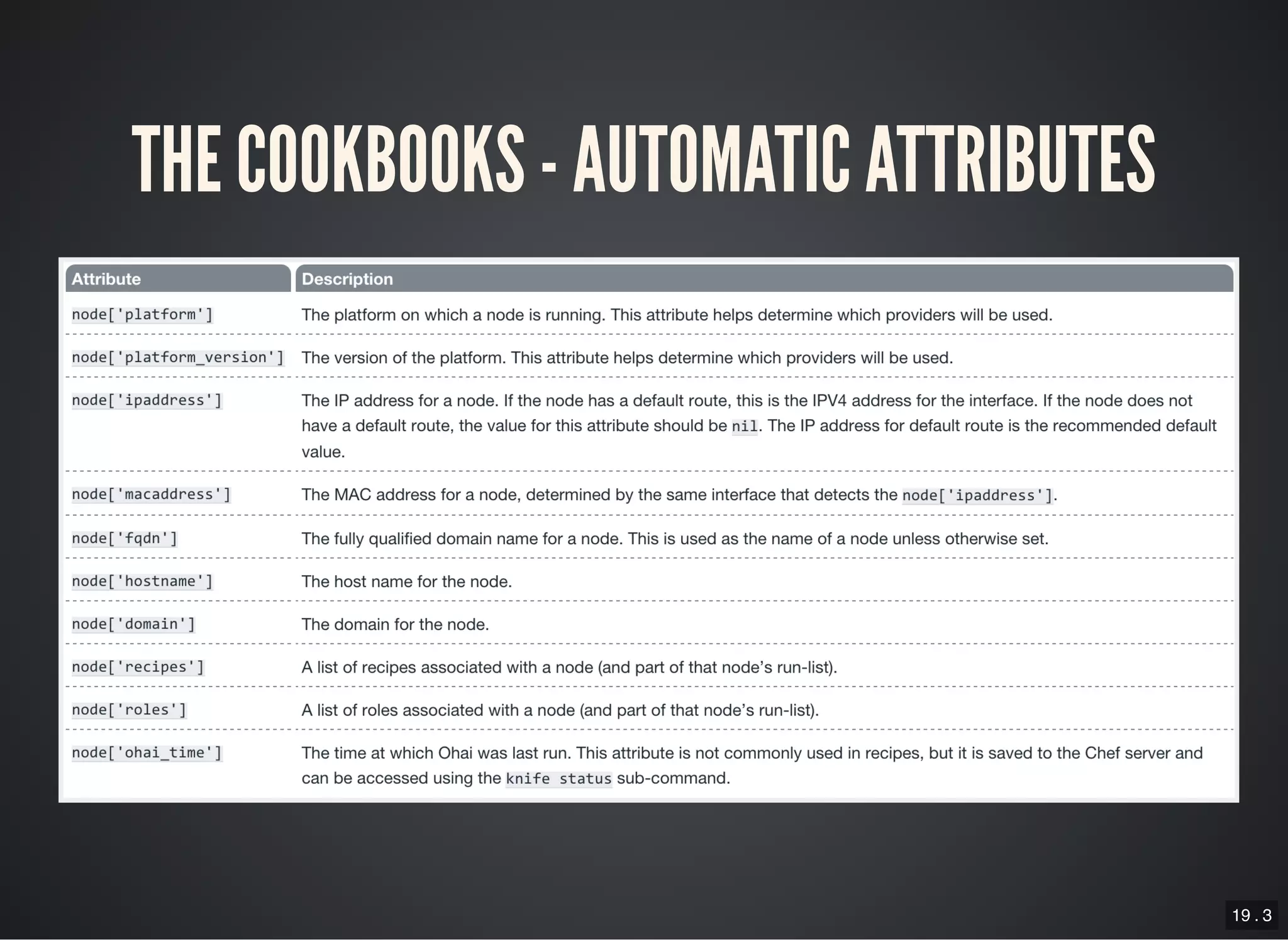
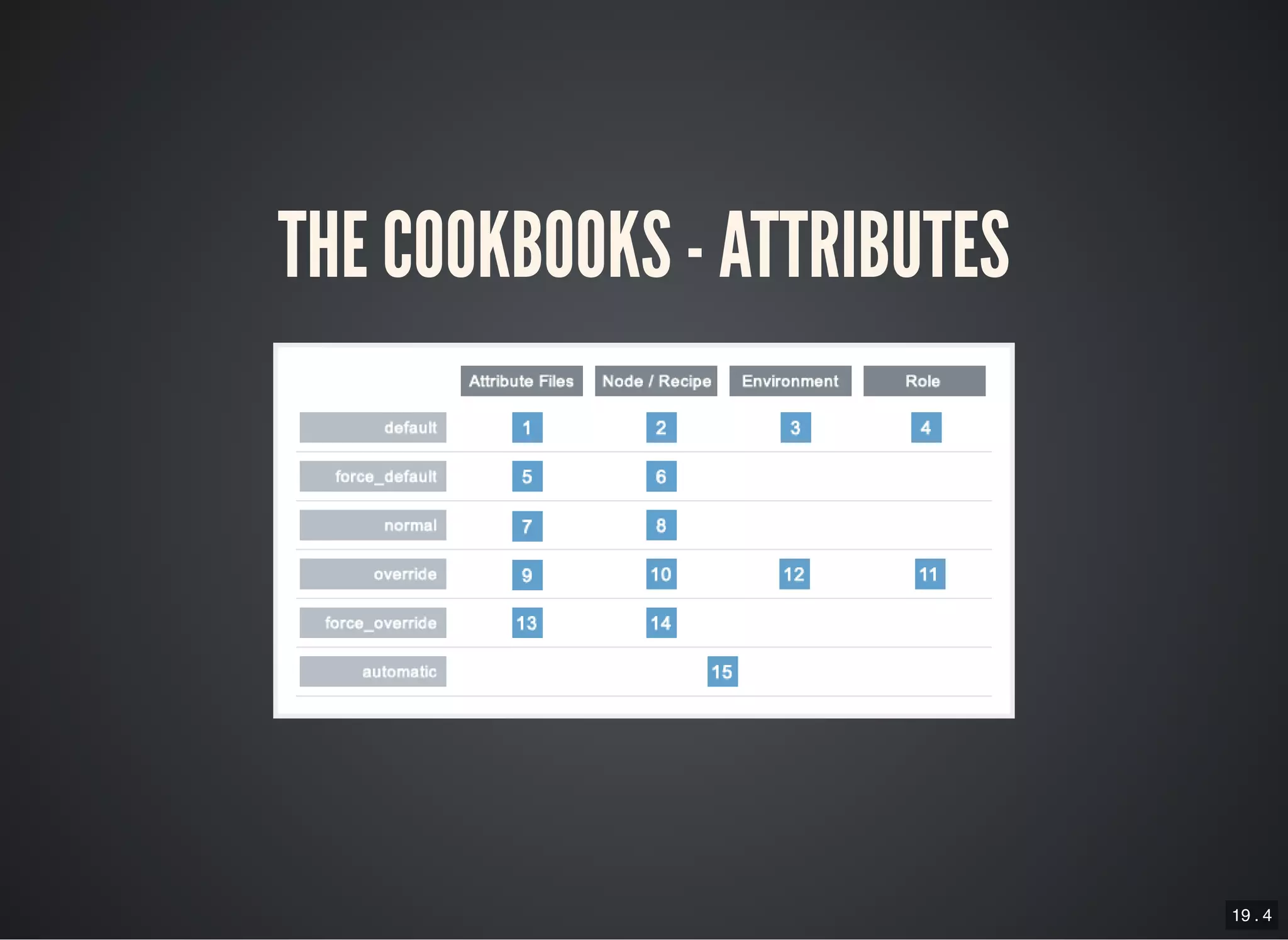
![20 . 1
THE COOKBOOKS - TEMPLATES
template '/etc/memcached.conf' do
source 'memcached.conf.erb'
owner 'root'
group 'root'
mode '0644'
variables(
:listen => node['memcached']['listen'],
:logfilename => node['memcached']['logfilename'],
:user => node['memcached']['user'],
:port => node['memcached']['port'],
:udp_port => node['memcached']['udp_port'],
:maxconn => node['memcached']['maxconn'],
:memory => node['memcached']['memory'],
:max_object_size => node['memcached']['max_object_size']
)
notifies :restart, 'service[memcached]'
end](https://image.slidesharecdn.com/chef-industrializeandautomateyourinfrastructure-170207093453/75/Chef-industrialize-and-automate-your-infrastructure-29-2048.jpg)
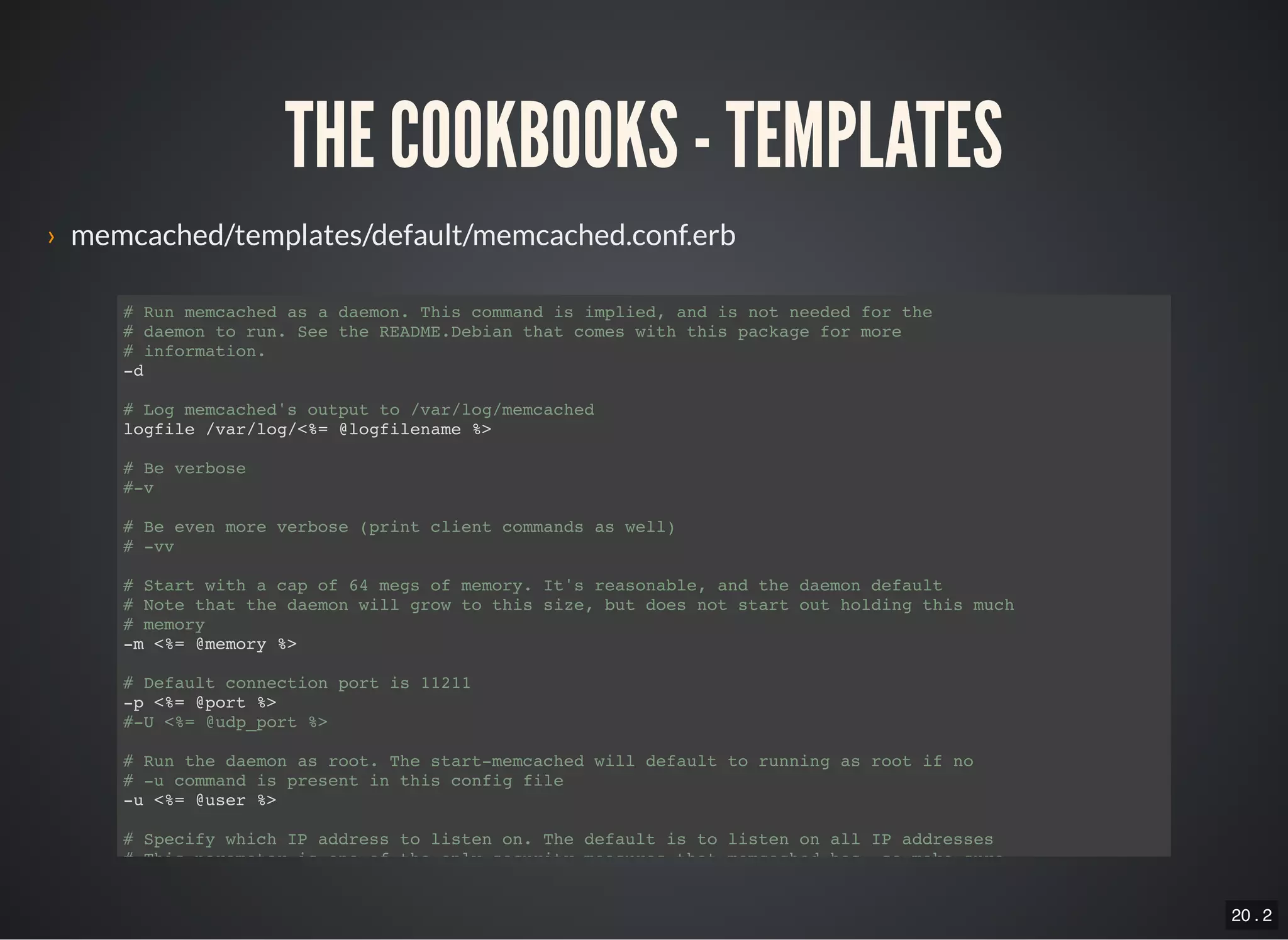
![21 . 1
THE COOKBOOKS - FILES
› cookbook/app/ les/default/application-5.8.3.pm
› cookbook/app/ les/default/application-5.20.1.pm
cookbook_file "application.pm" do
path case node['platform']
when "centos","redhat"
"/usr/lib/version/1.2.3/dir/application.pm"
when "arch"
"/usr/share/version/core_version/dir/application.pm"
else
"/etc/version/dir/application.pm"
end
source "application-#{node['languages']['perl']['version']}.pm"
owner 'root'
group 'root'
mode '0644'
end](https://image.slidesharecdn.com/chef-industrializeandautomateyourinfrastructure-170207093453/75/Chef-industrialize-and-automate-your-infrastructure-31-2048.jpg)
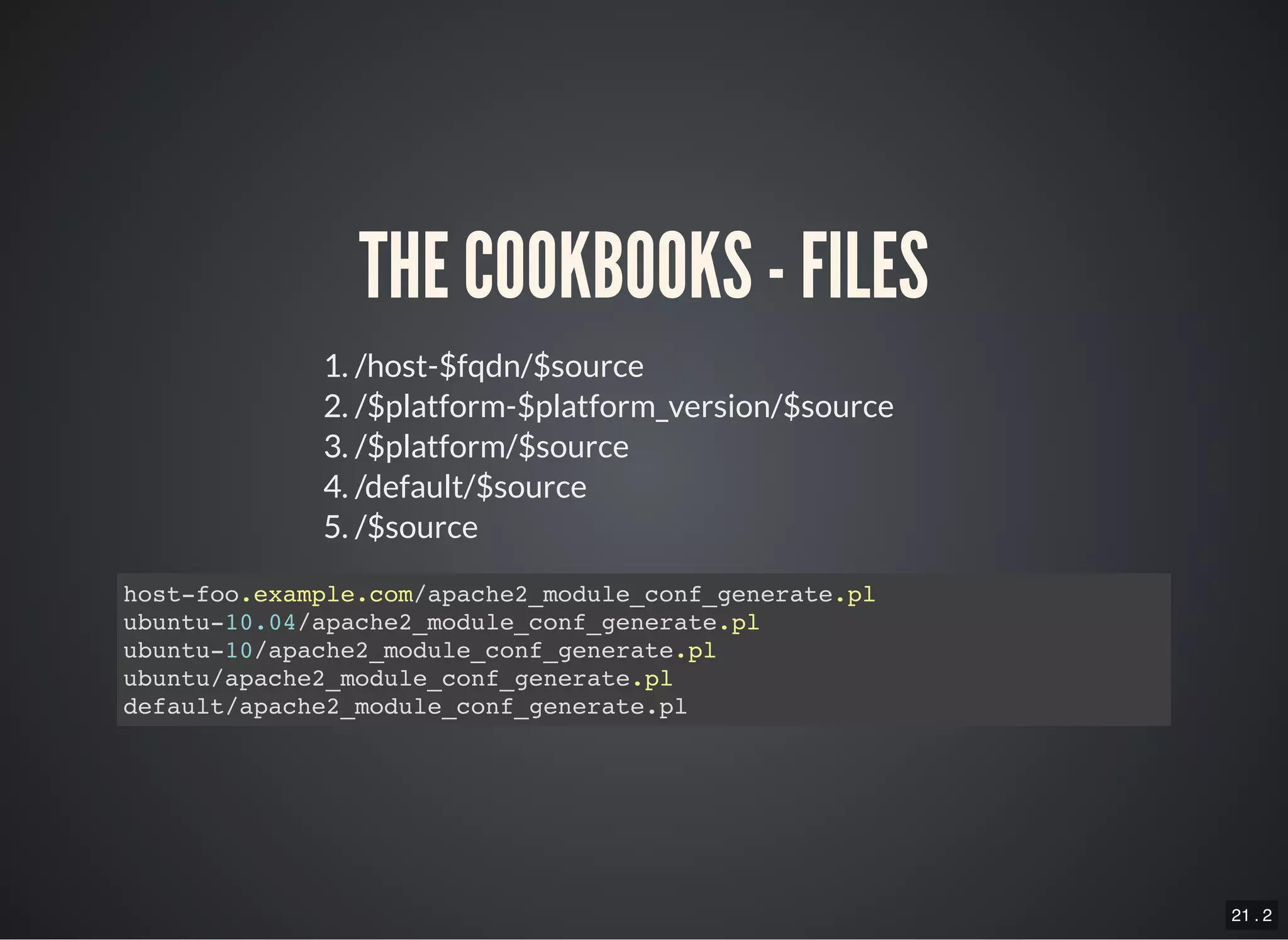
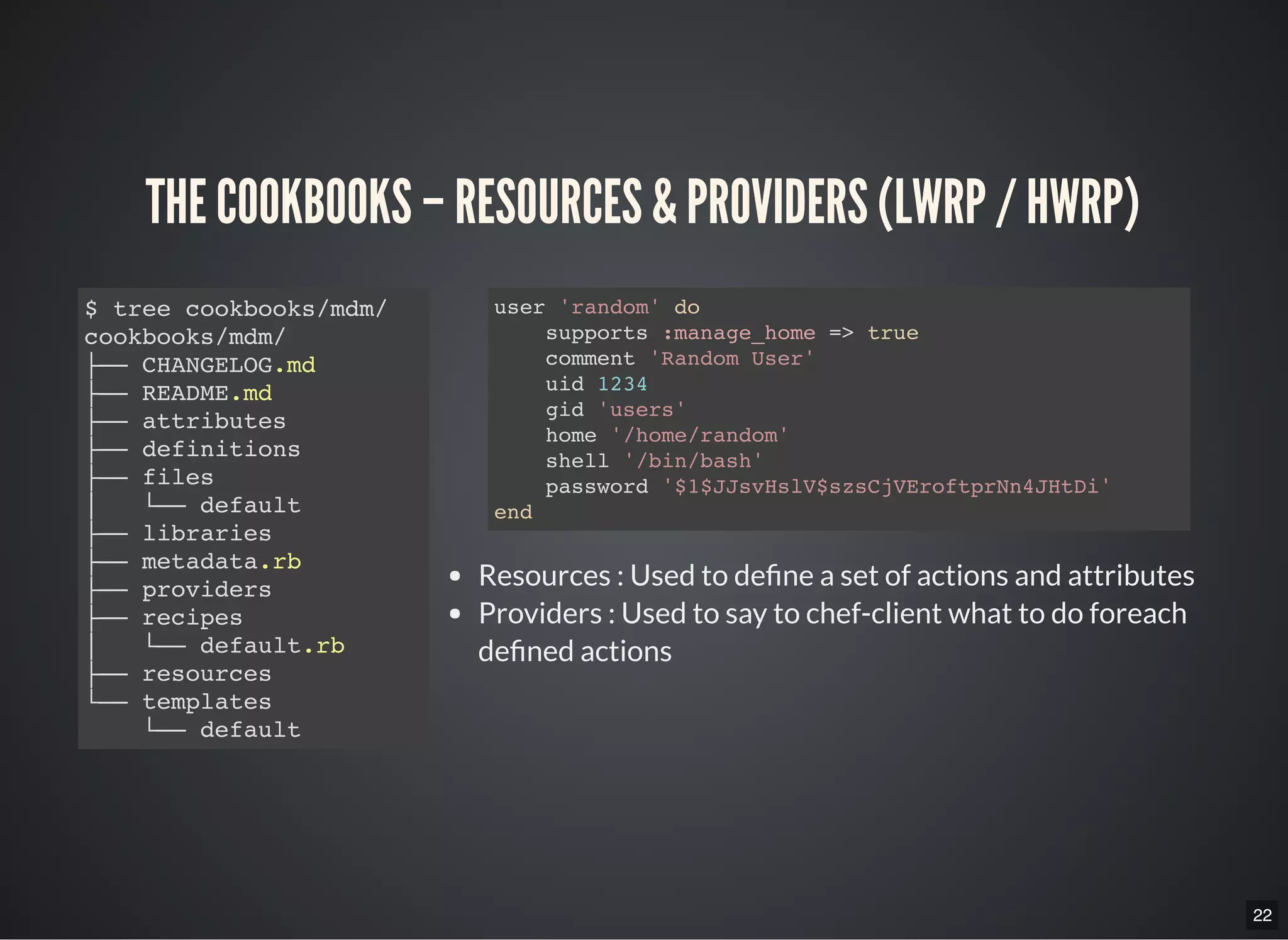
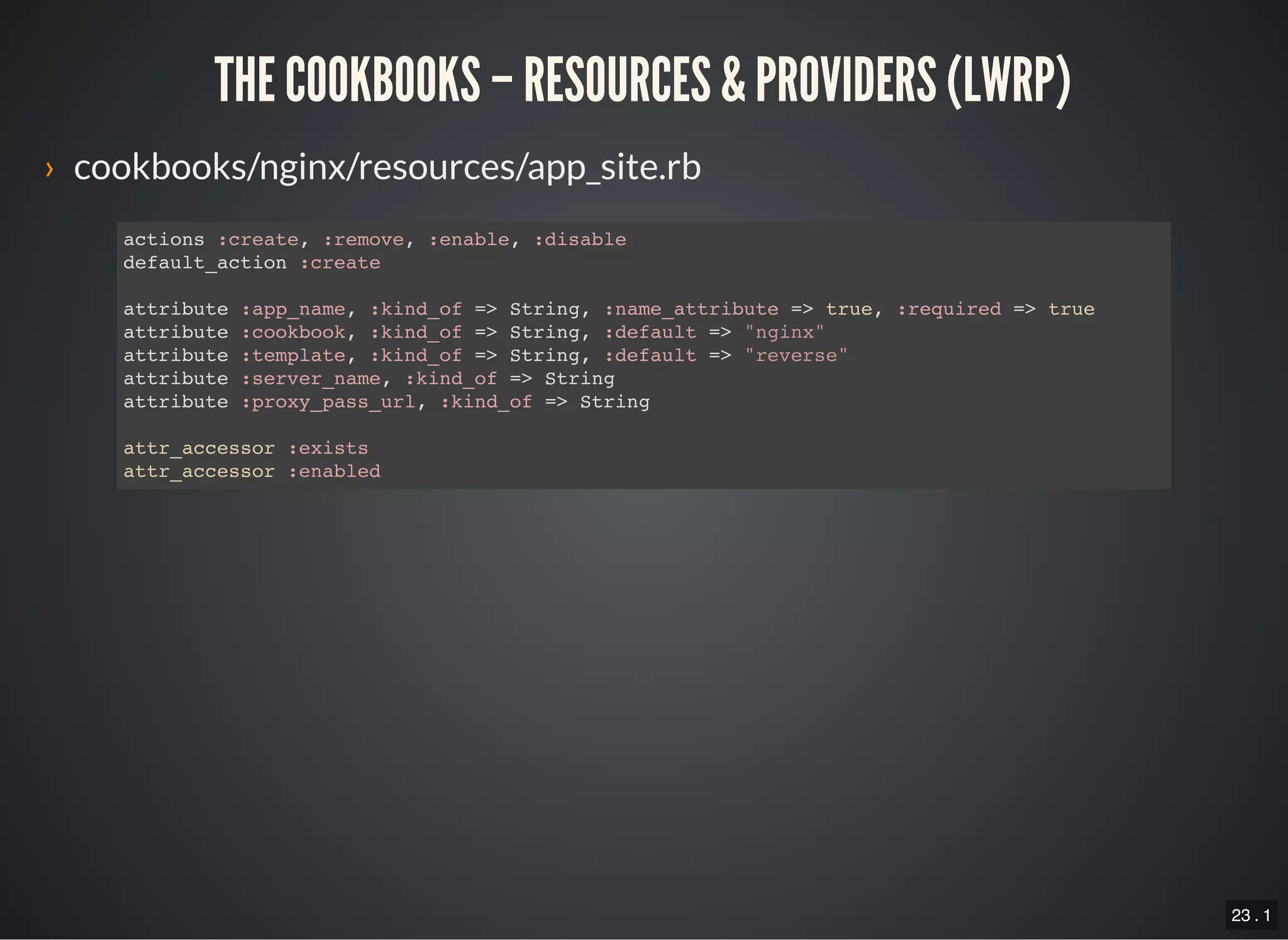
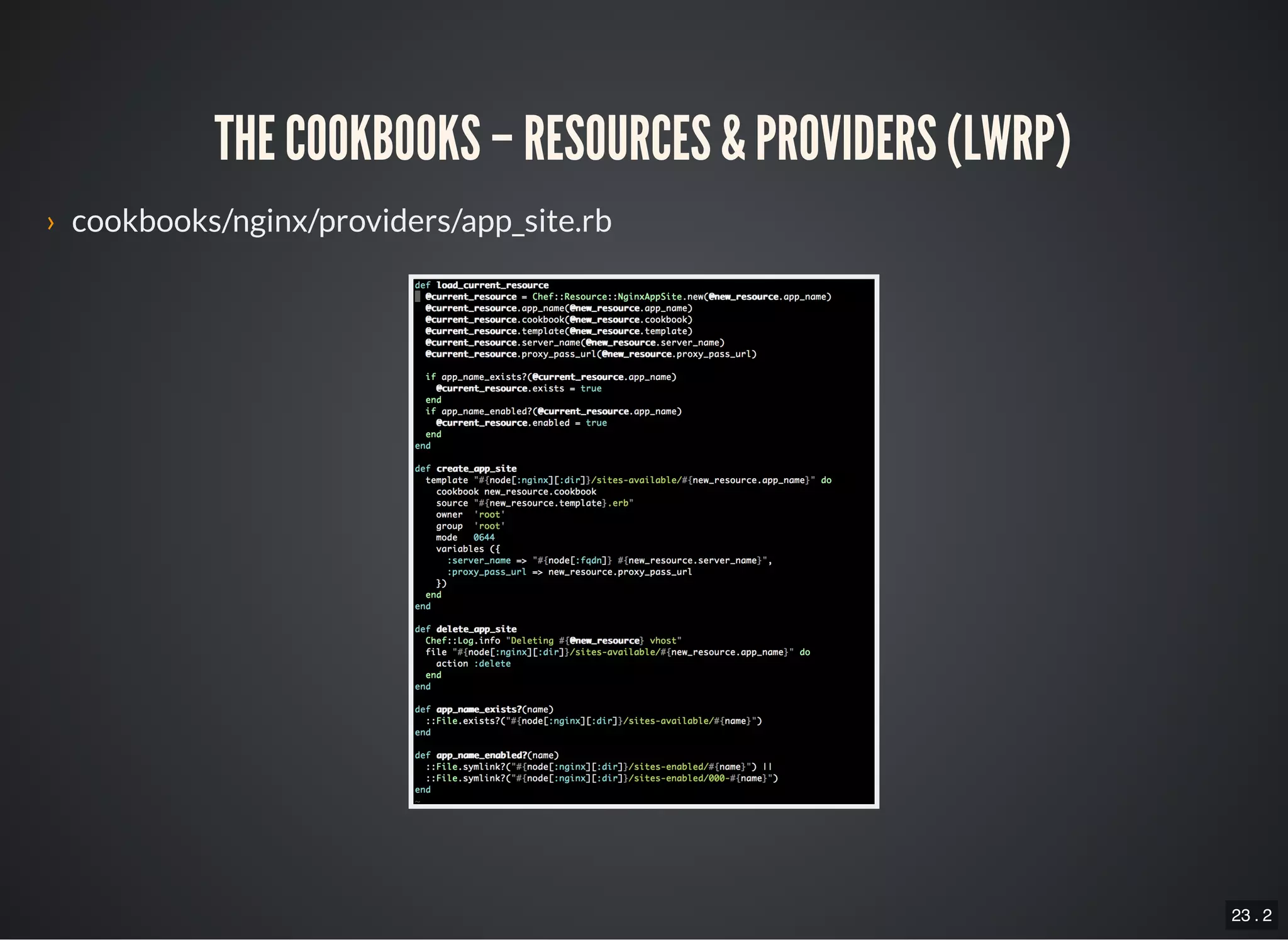
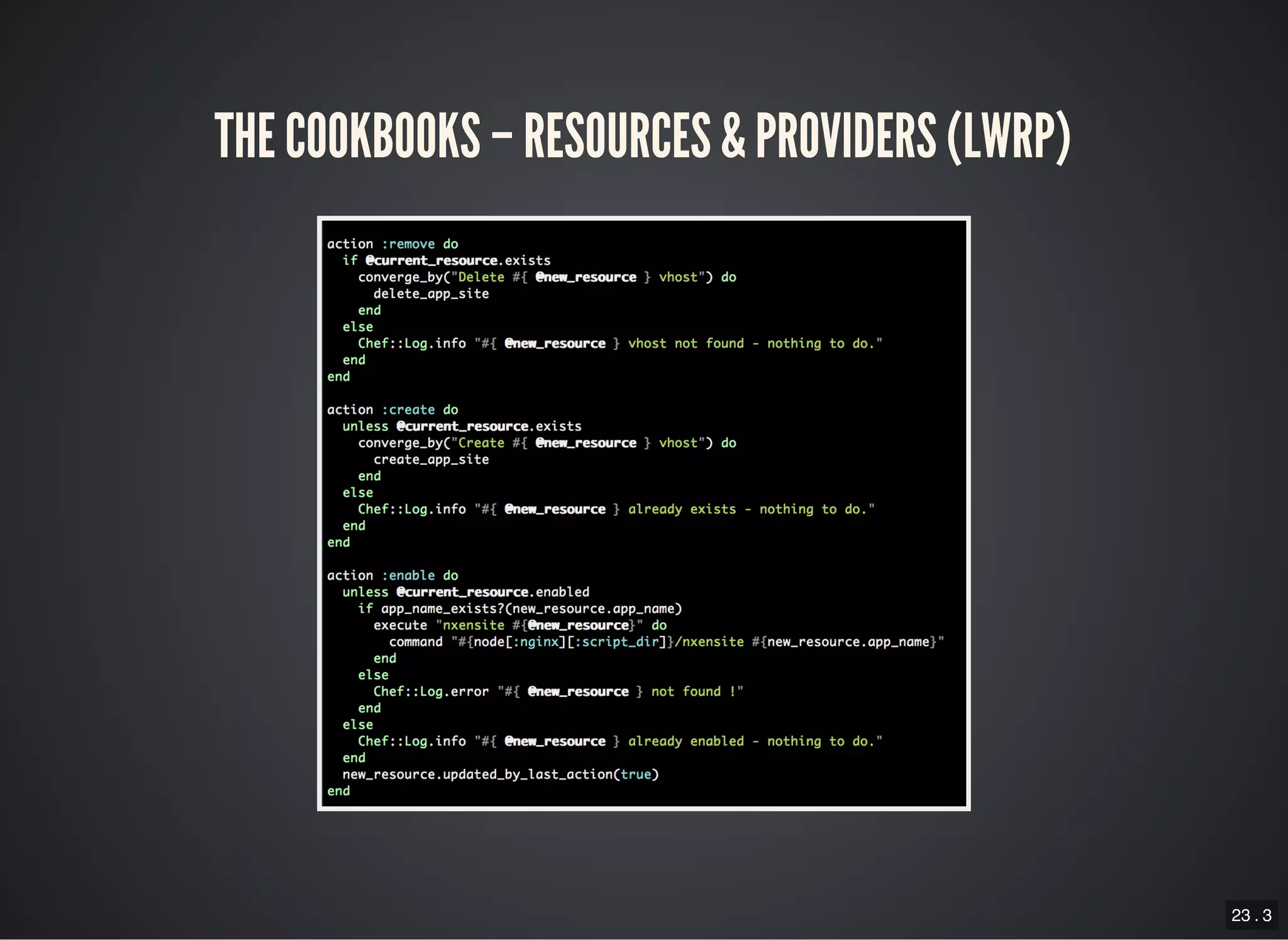
![23 . 4
THE COOKBOOKS – RESOURCES & PROVIDERS (LWRP)
› cookbooks/stash/recipes/nginx.rb
node.default['nginx']['default_site_enabled'] = false
include_recipe 'nginx'
nginx_app_site "stash" do
server_name node[:stash][:http_server][:virtual_host_name]
proxy_pass_url "http://localhost:#{node[:stash][:tomcat][:port]}"
cookbook "nginx"
template "reverse"
action [:create, :enable]
notifies :reload, 'service[nginx]', :delayed
end
nginx_app_site "stash-ssl" do
server_name node[:stash][:http_server][:virtual_host_name]
proxy_pass_url "http://localhost:#{node[:stash][:tomcat][:ssl_port]}"
cookbook "nginx"
template "reverse_ssl"
action [:create, :enable]
notifies :reload, 'service[nginx]', :delayed
end](https://image.slidesharecdn.com/chef-industrializeandautomateyourinfrastructure-170207093453/75/Chef-industrialize-and-automate-your-infrastructure-37-2048.jpg)
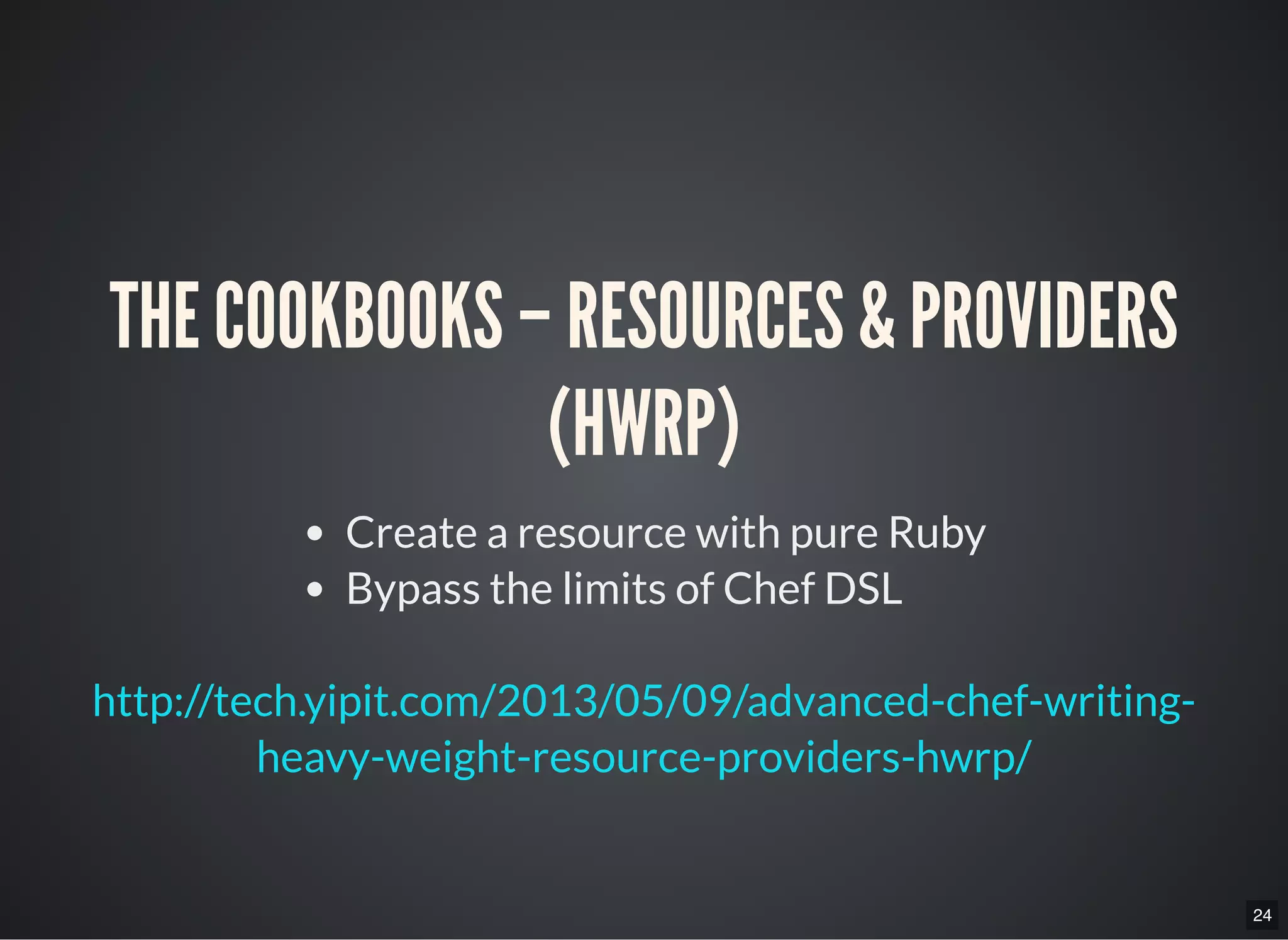
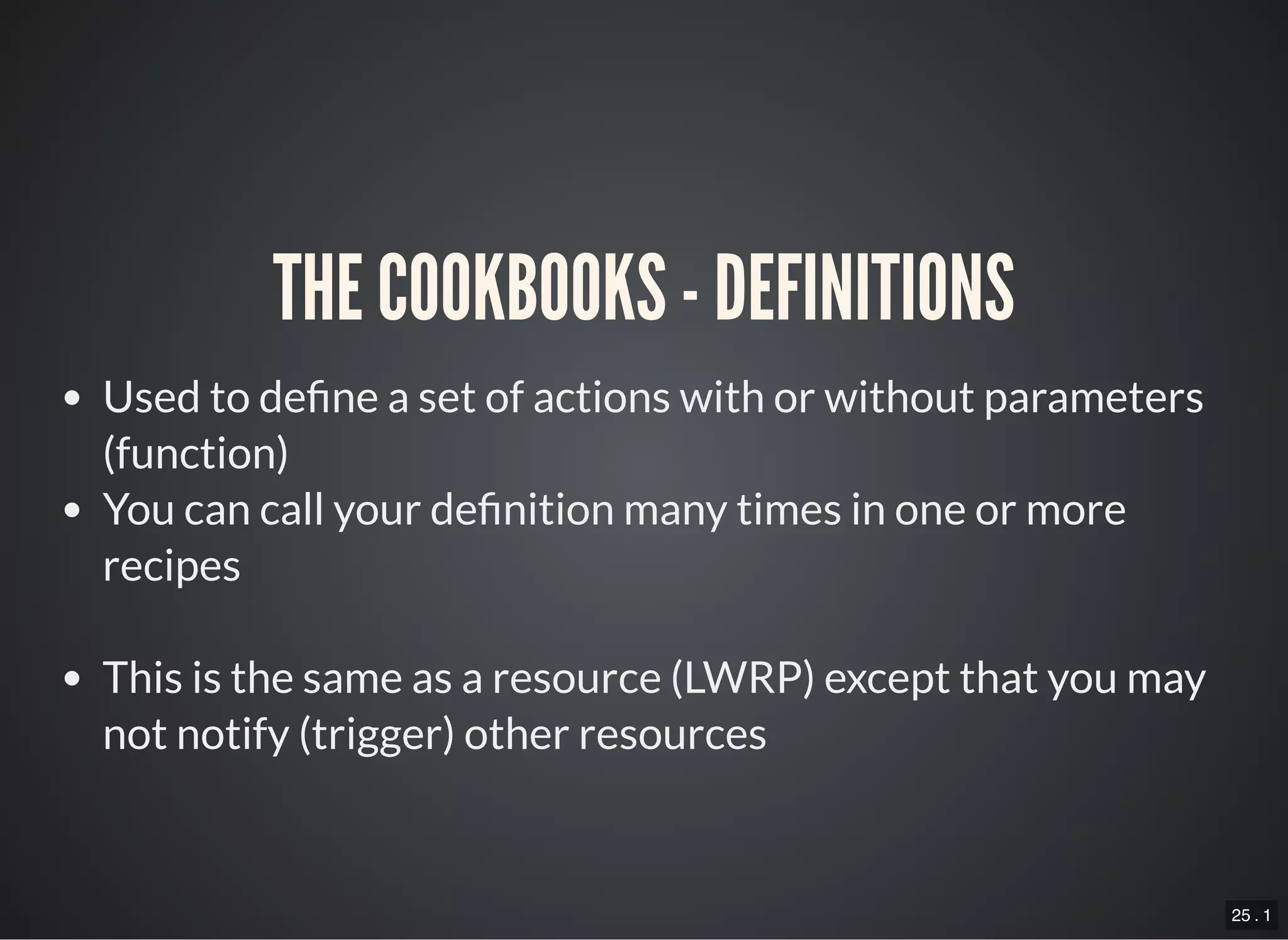
![25 . 2
THE COOKBOOKS - DEFINITIONS
define :host_porter, :port => 4000, :hostname => nil do
params[:hostname] ||= params[:name]
directory "/etc/#{params[:hostname]}" do
recursive true
end
file "/etc/#{params[:hostname]}/#{params[:port]}" do
content "some content"
end
end
host_porter node['hostname'] do
port 4000
end
host_porter "www1" do
port 4001
end](https://image.slidesharecdn.com/chef-industrializeandautomateyourinfrastructure-170207093453/75/Chef-industrialize-and-automate-your-infrastructure-40-2048.jpg)
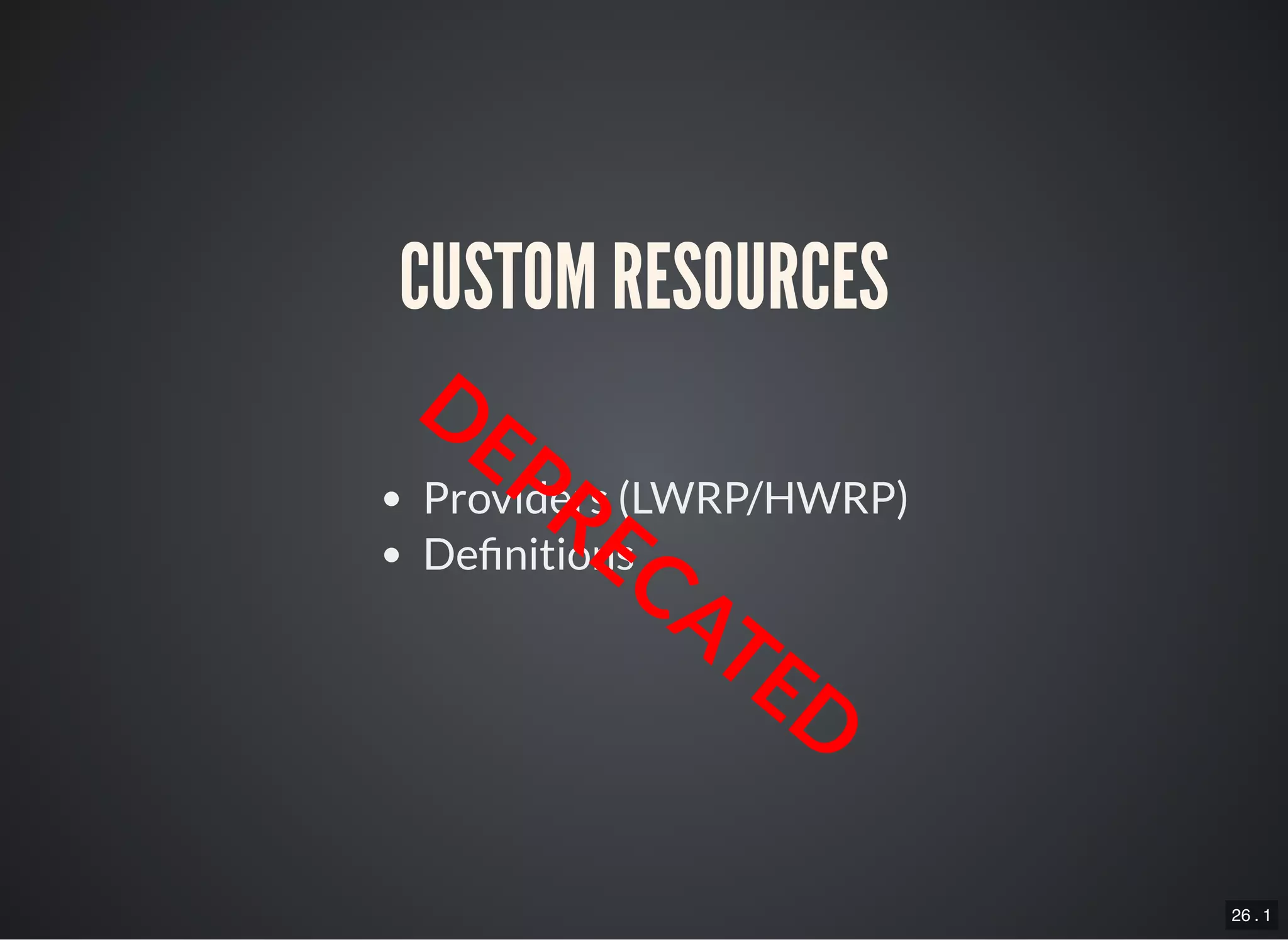
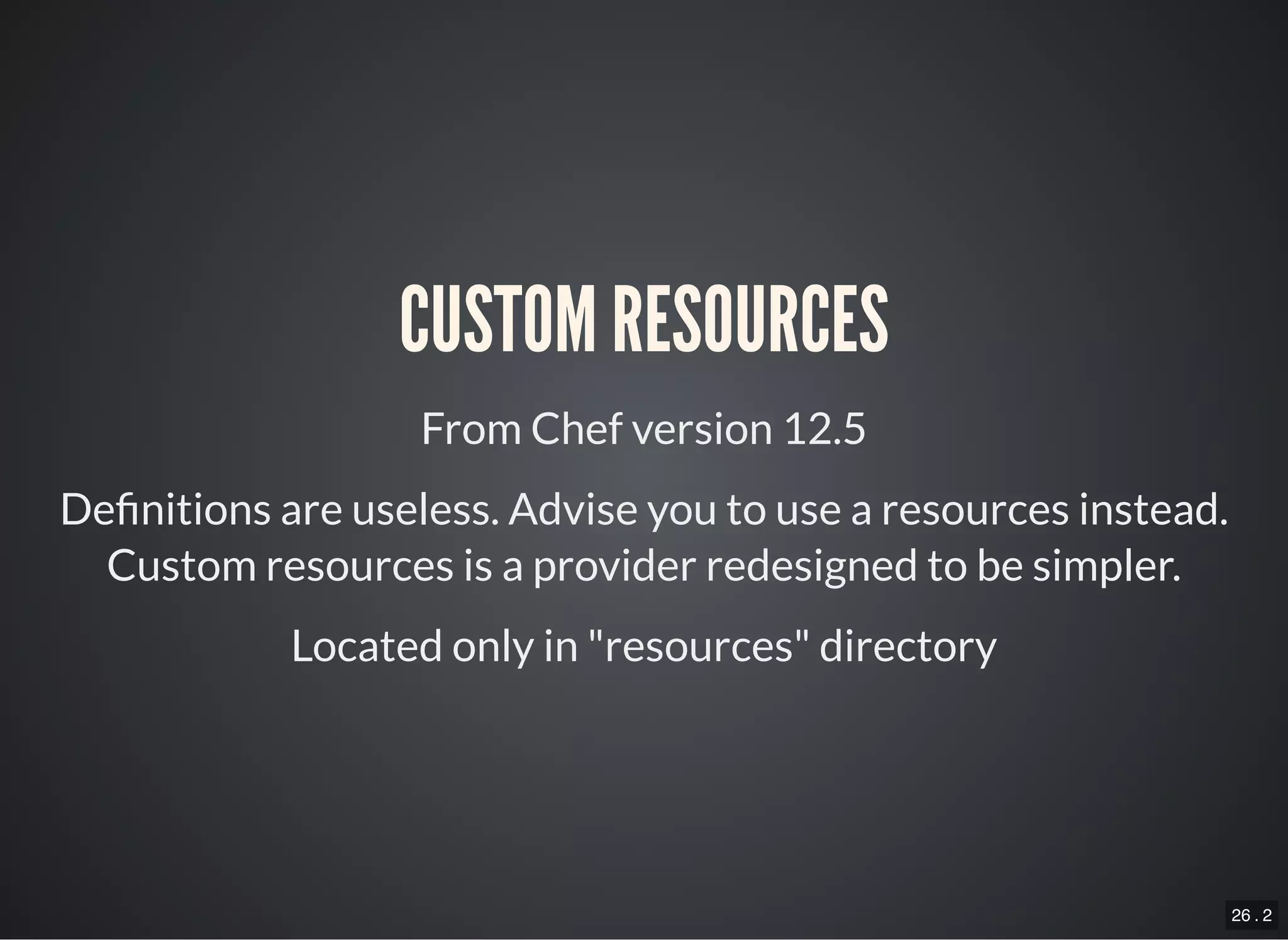
![26 . 3
CUSTOM RESOURCES
exampleco/resources/site.rb
property :homepage, String, default: '<h1>Hello world!</h1>'
load_current_value do
if ::File.exist?('/var/www/html/index.html')
homepage IO.read('/var/www/html/index.html')
end
end
action :create do
package 'httpd'
service 'httpd' do
action [:enable, :start]
end
file '/var/www/html/index.html' do
content homepage
end
end
action :delete do
package 'httpd' do
action :delete
end
end
exampleco_site 'httpd' do
homepage '<h1>Welcome to the Example Co. website!</h1>'
action :create
end](https://image.slidesharecdn.com/chef-industrializeandautomateyourinfrastructure-170207093453/75/Chef-industrialize-and-automate-your-infrastructure-43-2048.jpg)
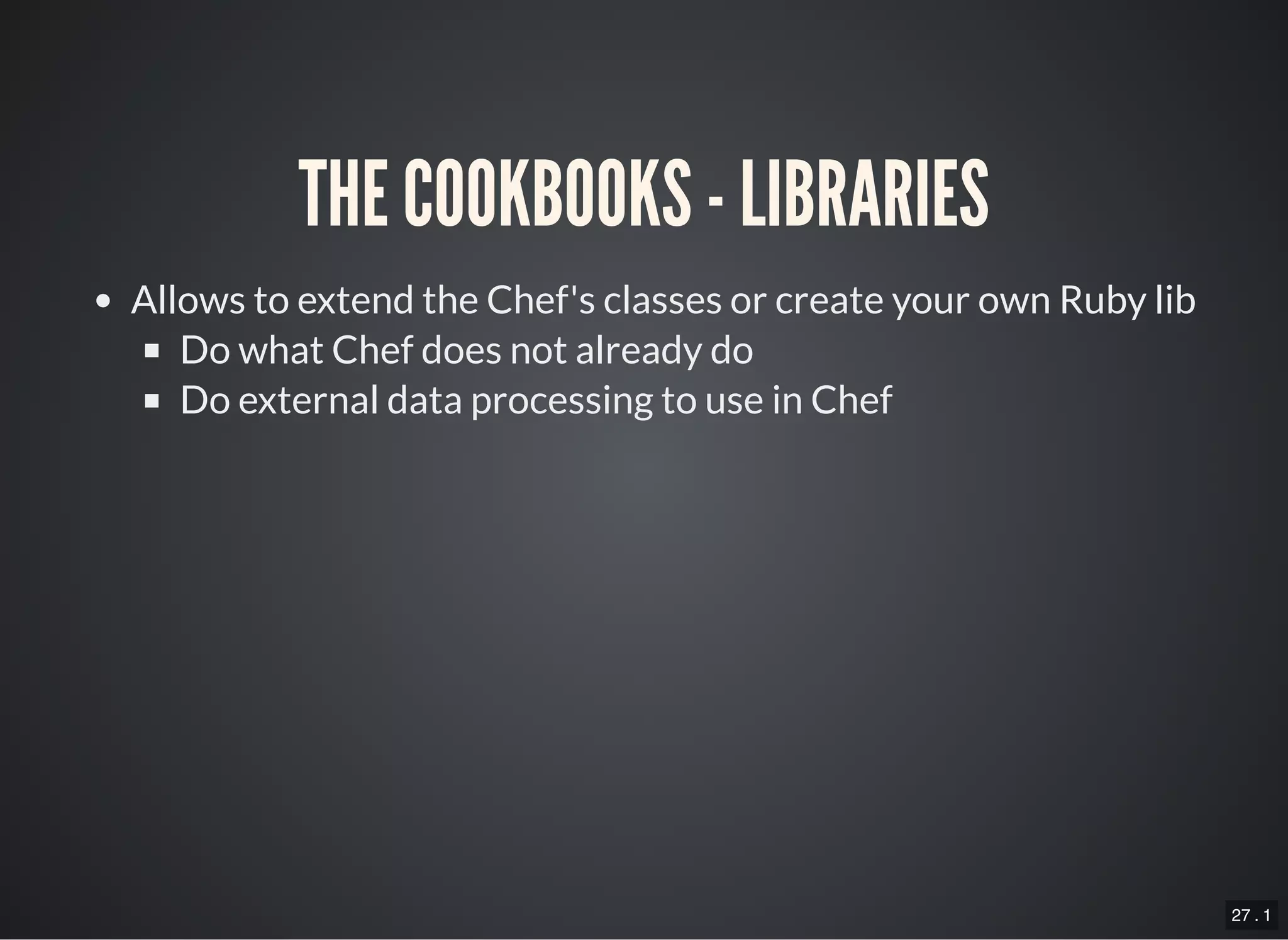
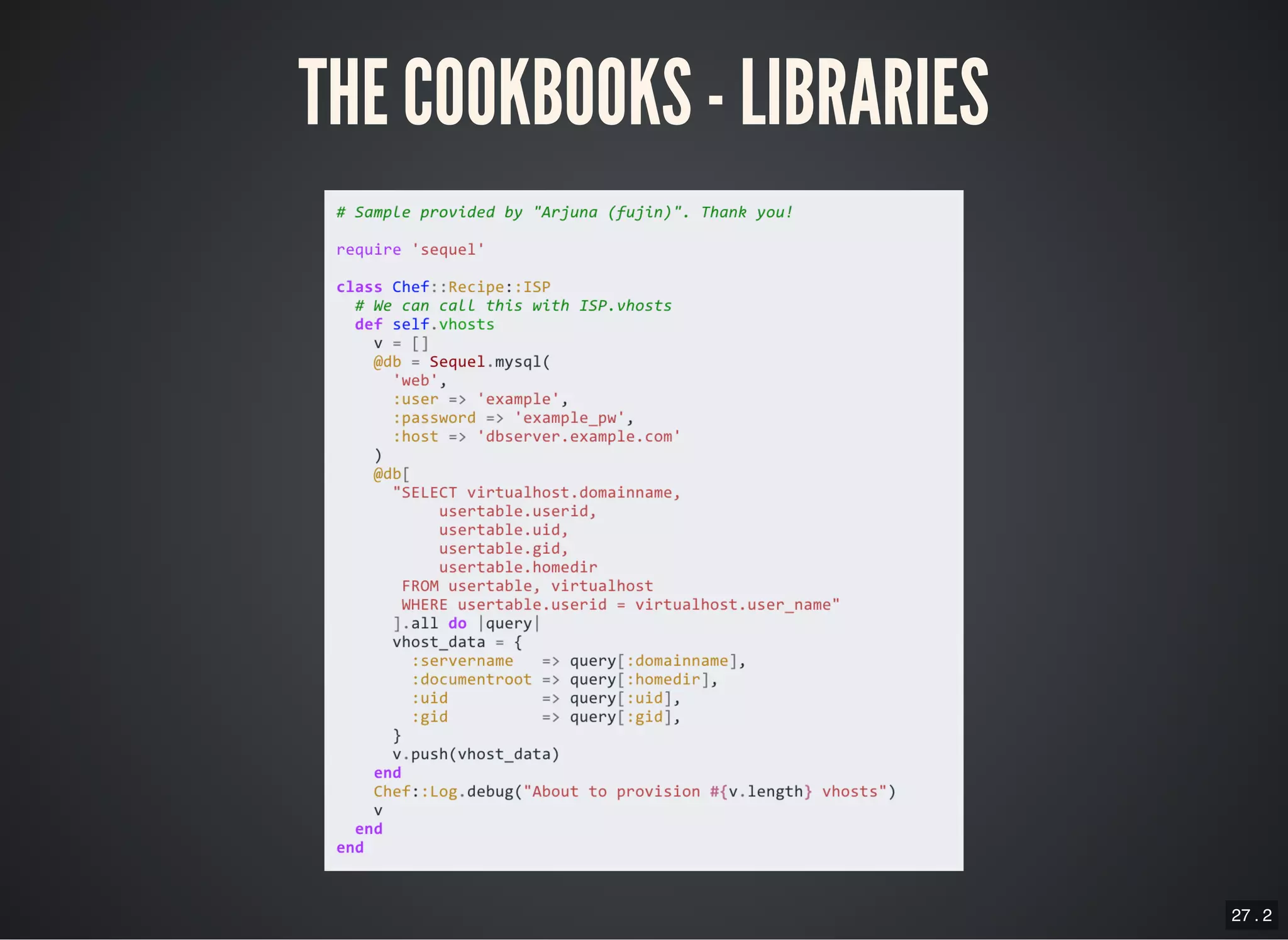
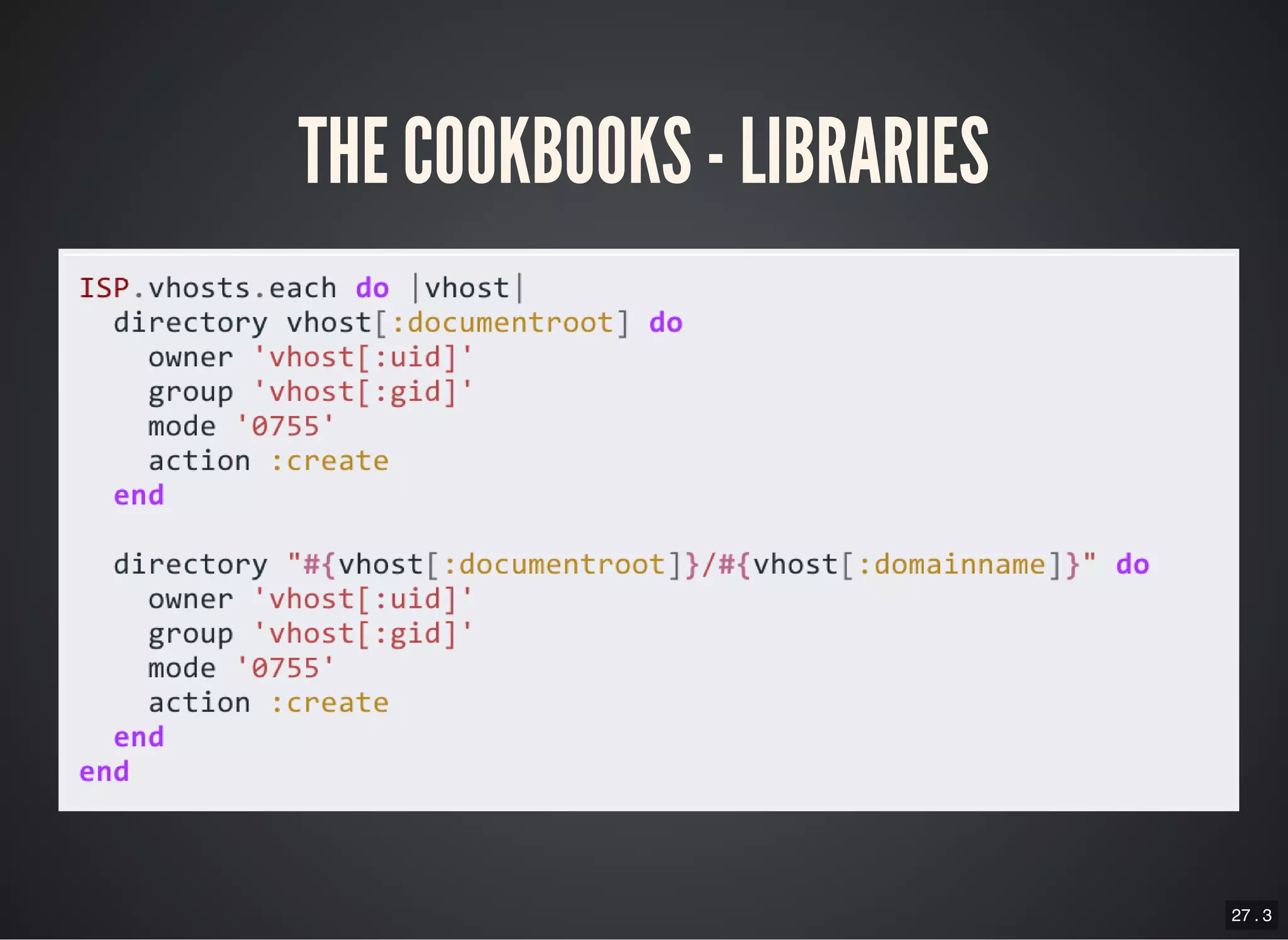
![28
ROLES
Used to group one or more roles, attributes and recipes
{
"name": "ns",
"description": "The DNS Role",
"json_class": "Chef::Role",
"default_attributes": {
"bind": {
"dnssec-validation": "no",
"zone-statistics": "yes",
"zones": [ "company.local", "0.168.192.in-addr.arpa" ],
"acls": {
"slaves": [ "192.168.0.2", "192.168.0.3" ],
"mdm_network": [ "192.168.0.0/24" ]
},
"allow_query": ["localhost", "company_network"],
"allow_recursion": ["localhost", "company_network"],
"allow_query_cache": ["localhost", "company_network"],
"also_notify": true,
}
},
"override_attributes": {
"bind": {
"masters": ["192.168.0.1"],
"allow_transfer": ["slaves"]
},
"ntp": {
"is_server": true,
"servers": ["0.fr.pool.ntp.org", "1.fr.pool.ntp.org", "2.fr.pool.ntp.org", "3.fr.pool.ntp.org"],
"restrictions": ["192.168.0.0 mask 255.255.255.0 nomodify notrap"]](https://image.slidesharecdn.com/chef-industrializeandautomateyourinfrastructure-170207093453/75/Chef-industrialize-and-automate-your-infrastructure-47-2048.jpg)
![29
ENVIRONNEMENTS
{
"name": "staging",
"description": "The Staging environment",
"cookbook_versions": {
"box": "= 0.3.8",
"nginx": "= 0.5.3",
"web": "= 1.4.29",
"base": "= 0.3.4",
"tools": "= 0.4.2",
"users": "= 1.7.5",
"db": "= 0.3.5",
"ambari": "= 0.7.1"
},
"json_class": "Chef::Environment",
"chef_type": "environment",
"default_attributes": {
"php-fpm": {
"session": {
"save_handler_type": "memcache",
"save_handler_path": "tcp://localhost:11211"
},
"log_level": "alert",
"emergency_restart_threshold": "10",
"emergency_restart_interval": "1m",
"process_control_timeout": "10s"
},
"nginx": {
"keepalive_timeout": "40s",
"client_body_timeout": "20s",
"client_header_timeout": "20s",
"server_tokens": "off",
"disable_access_log": "true",
"mdm_log_format": "true",
"fastcgi_buffers": "8 16k",
"fastcgi_buffer_size": "32k",
Sets behaviors or different attributes for a given environment
include_recipe 'sshd'
include_recipe 'sudo'
include_recipe 'users::system'
include_recipe 'users::admins'
include_recipe 'users::operators'
if node.chef_environment != 'prod'
include_recipe 'users::qa'
include_recipe 'users::devops'
end
case node[:platform_family]
when 'debian'
include_recipe 'apt'
when 'rhel', 'fedora'
include_recipe 'yum'
include_recipe 'yum-epel'
include_recipe 'selinux::disabled'
include_recipe 'iptables::disabled'
end
include_recipe 'timezone-ii'
include_recipe 'ntp'
include_recipe 'postfix'
include_recipe 'snmp'
include_recipe 'locales'
include_recipe 'line'](https://image.slidesharecdn.com/chef-industrializeandautomateyourinfrastructure-170207093453/75/Chef-industrialize-and-automate-your-infrastructure-48-2048.jpg)
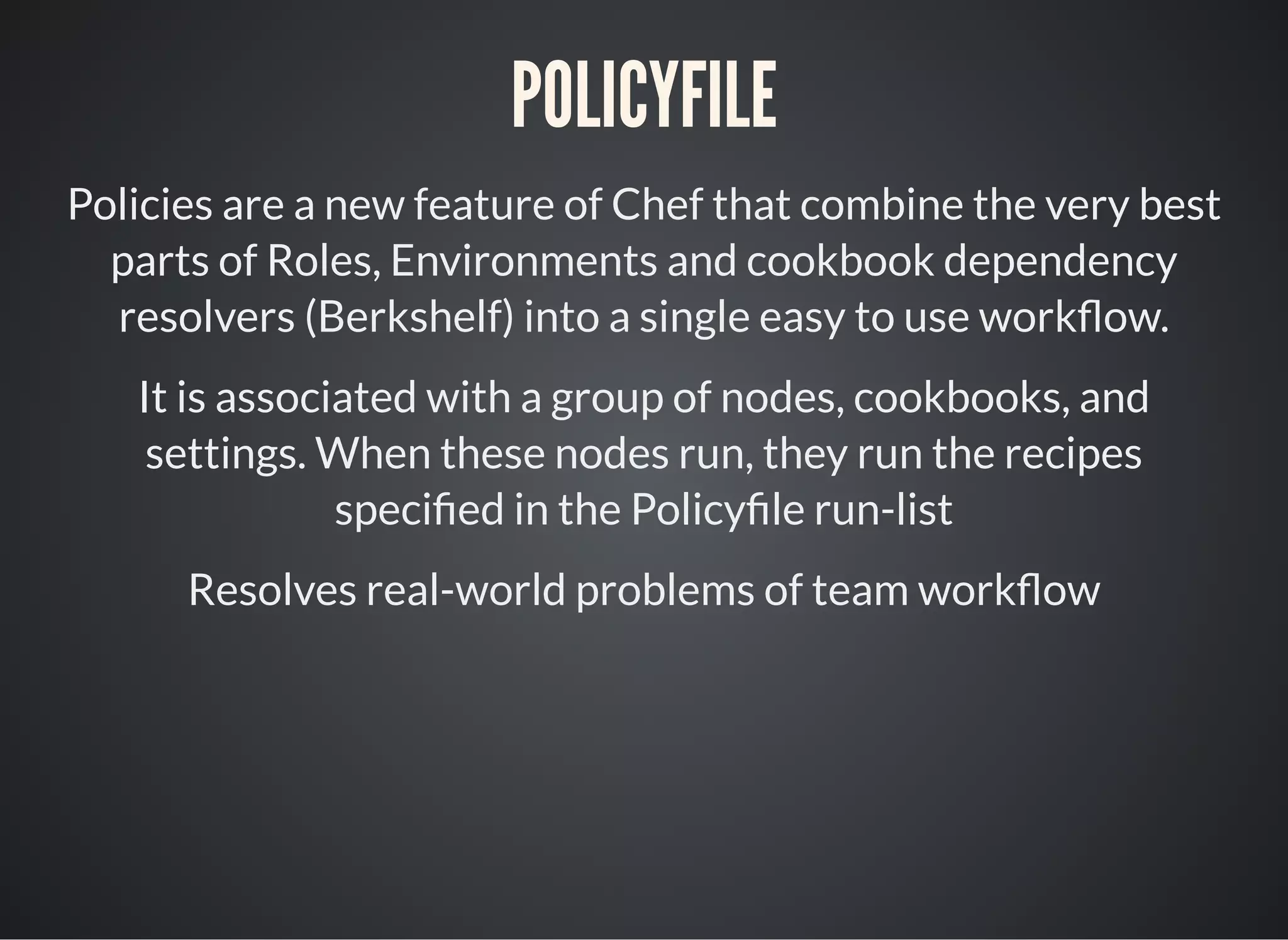
![30 . 130 . 2
POLICYFILE
De ne in Policy le:
› Run list
› Cookbook dependencies with version constraint and source
› Attributes overriding
name "jenkins-master"
run_list "java", "jenkins::master", "recipe[policyfile_demo]"
default_source :supermarket, "https://mysupermarket.example"
cookbook "policyfile_demo", path: "cookbooks/policyfile_demo"
cookbook "jenkins", "~> 2.1"
cookbook "mysql", github: "chef-cookbooks/mysql", branch: "master"
default['java']['version'] = '8'](https://image.slidesharecdn.com/chef-industrializeandautomateyourinfrastructure-170207093453/75/Chef-industrialize-and-automate-your-infrastructure-50-2048.jpg)
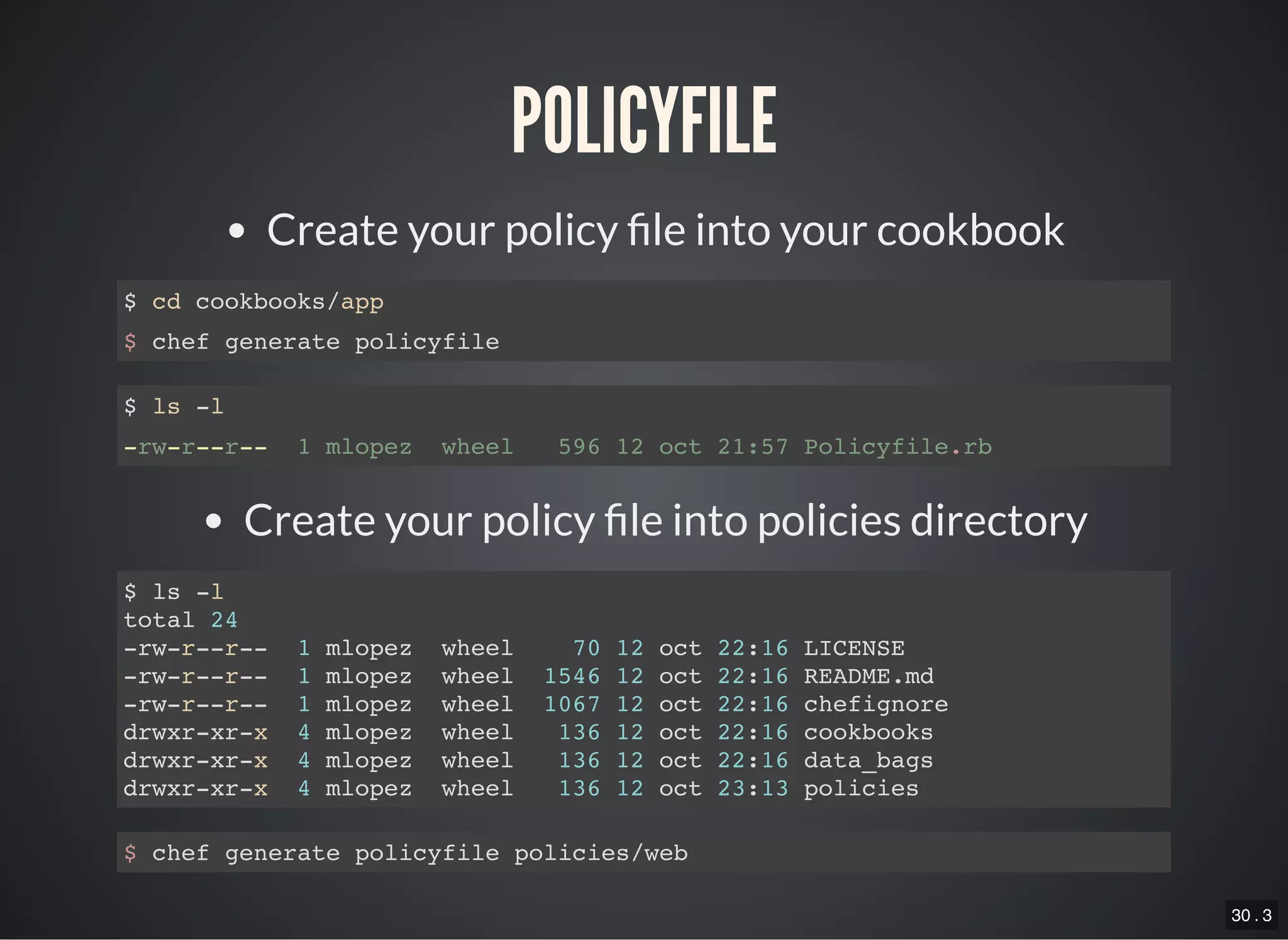
![30 . 4
Create the lock le
$ chef install [path/to/policyfile.rb]
Update lock le after modi cation
$ chef update [path/to/policyfile.rb]
Upload cookbook and policy le
$ chef push POLICY_GROUP PATH/TO/POLICYFILE.rb
→ If POLICY_GROUP doesn't exists it will be created
Assign policy name and policy group into client.rb's node or in
node con guration](https://image.slidesharecdn.com/chef-industrializeandautomateyourinfrastructure-170207093453/75/Chef-industrialize-and-automate-your-infrastructure-52-2048.jpg)
![31 . 1
DATA BAGS
Stock & share data
Read the desired data from a recipe or from your desktop (knife)
Write data collected during a run
$ knife data bag create DATA_BAG_NAME [ITEM]
knife data bag create users toto
knife data bag from file users data_bags/users/toto.json](https://image.slidesharecdn.com/chef-industrializeandautomateyourinfrastructure-170207093453/75/Chef-industrialize-and-automate-your-infrastructure-53-2048.jpg)
![31 . 2
DATA BAGS
› knife data bag create users myUser
{
"id": "myUser",
"ssh_keys": [
"ssh-rsa AAAAB3NzaC1yc2EAAAADAQABAAABAQDakMx4mjWYMko2r085yq/vq0Ey2DiVWXeJ
],
"groups": [
"mdm_qa"
],
"uid": 4001,
"shell": "/bin/bash",
"comment": "My User",
"action": "remove"
}
› knife data bag show users myUser –Fj > data_bags/users/myUser.json](https://image.slidesharecdn.com/chef-industrializeandautomateyourinfrastructure-170207093453/75/Chef-industrialize-and-automate-your-infrastructure-54-2048.jpg)
![31 . 3
DATA BAGS
admins = []
search(:admins, "*:*").each do |admin|
login = admin[‘id’]
admins << login
home = "/home/#{login}"
user login do
uid admin['uid']
gid admin['gid']
shell admin['shell']
home home
comment admin['comment’]
supports :manage_home => true
end
end](https://image.slidesharecdn.com/chef-industrializeandautomateyourinfrastructure-170207093453/75/Chef-industrialize-and-automate-your-infrastructure-55-2048.jpg)
![31 . 4
Write in a data bag
DATA BAGS
sam = {
"id" => "sam",
"Full Name" => "Sammy",
"shell" => "/bin/zsh"
}
databag_item = Chef::DataBagItem.new
databag_item.data_bag("users")
databag_item.raw_data = sam
databag_item.save
sam = data_bag_item("users", "sam")
sam["Full Name"] = "Samantha"
sam.save](https://image.slidesharecdn.com/chef-industrializeandautomateyourinfrastructure-170207093453/75/Chef-industrialize-and-automate-your-infrastructure-56-2048.jpg)
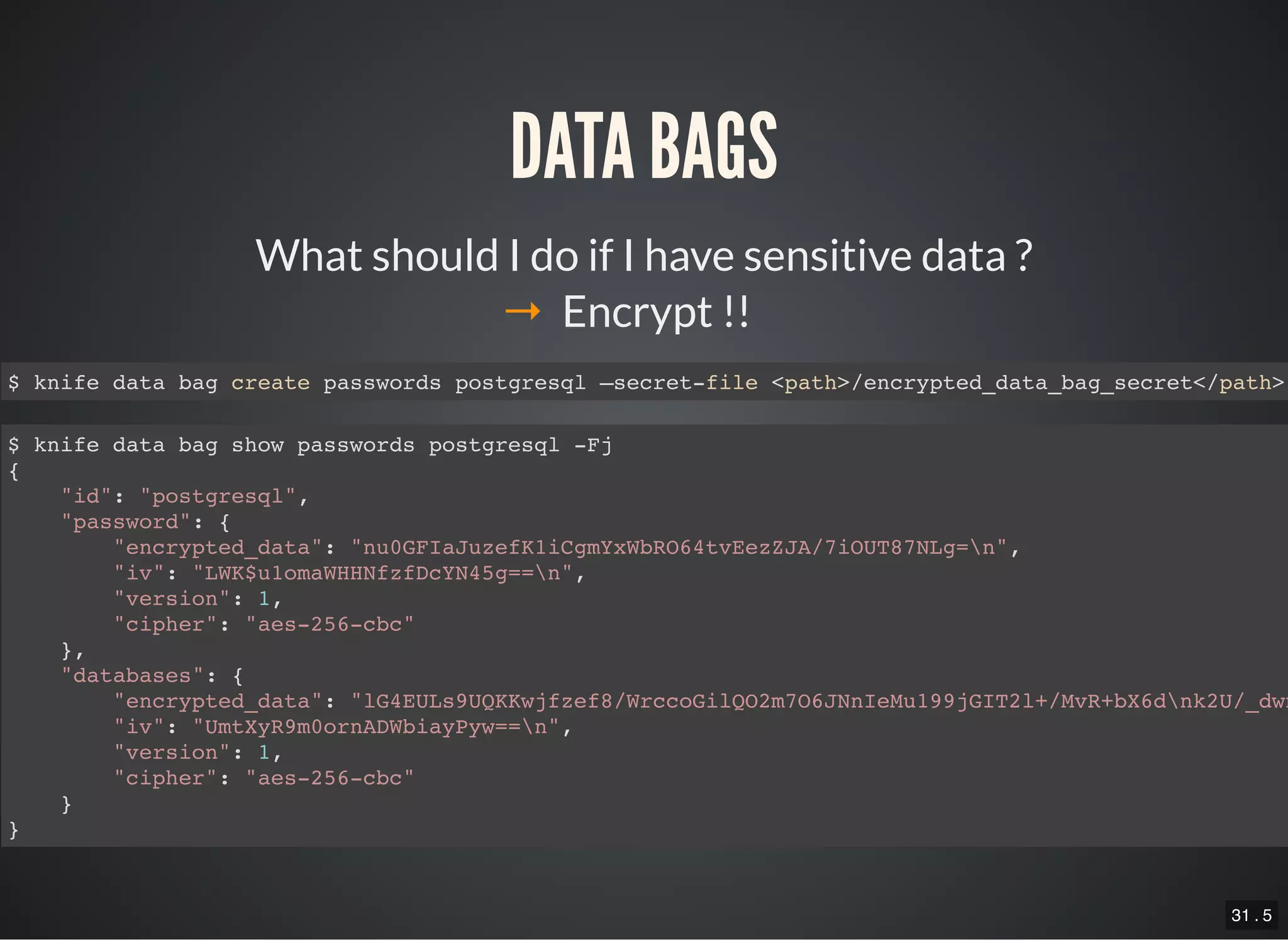

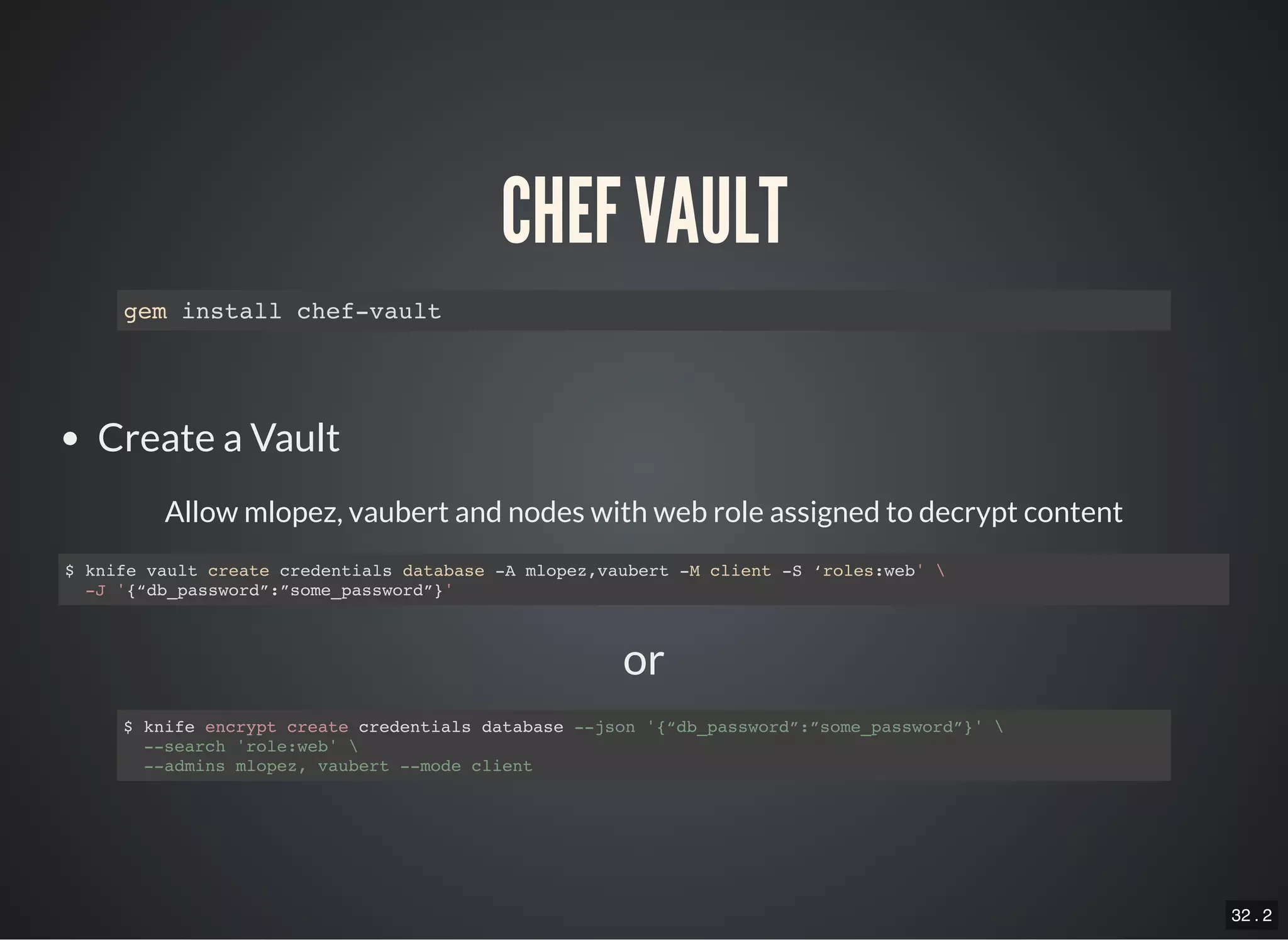
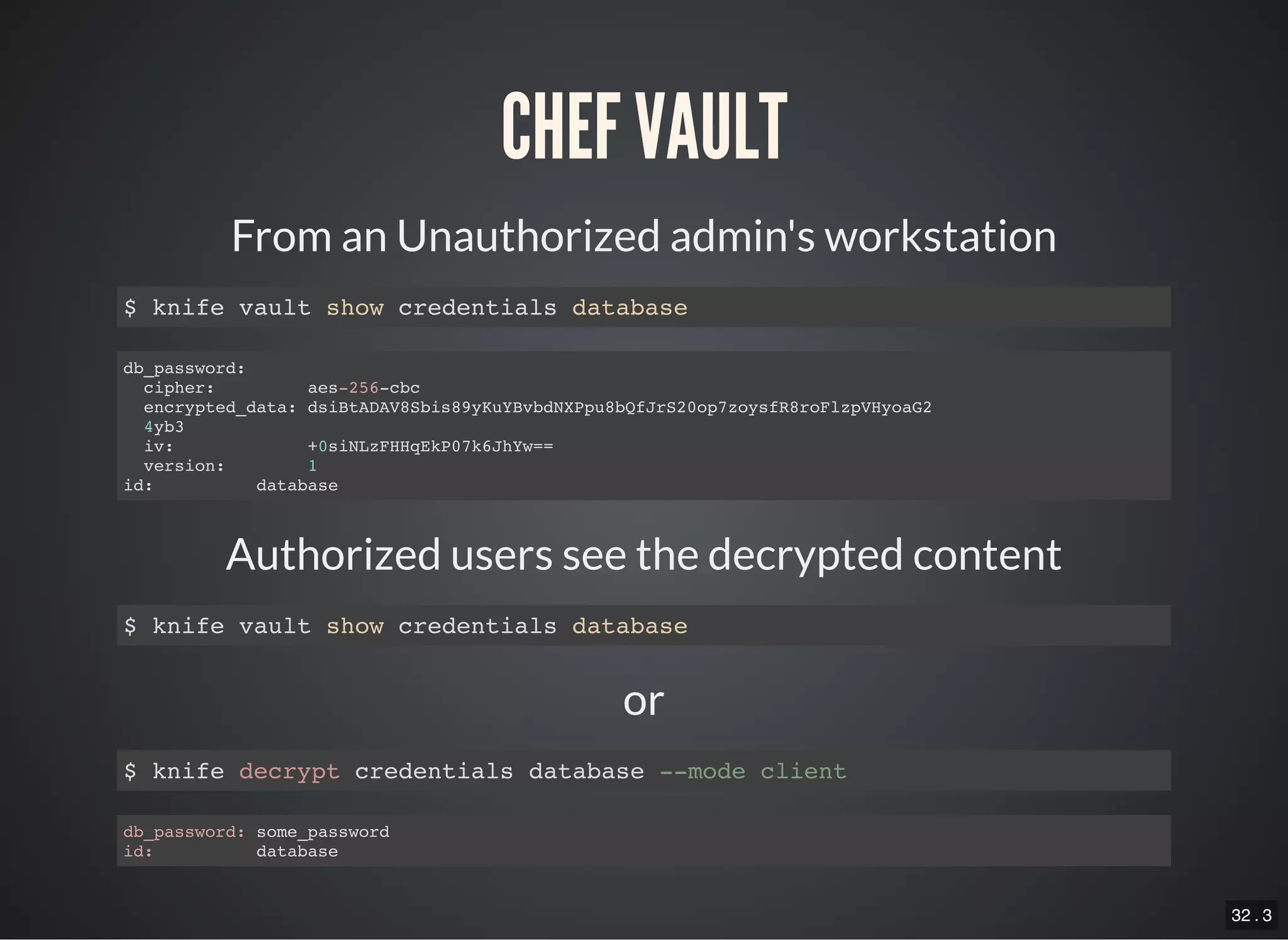
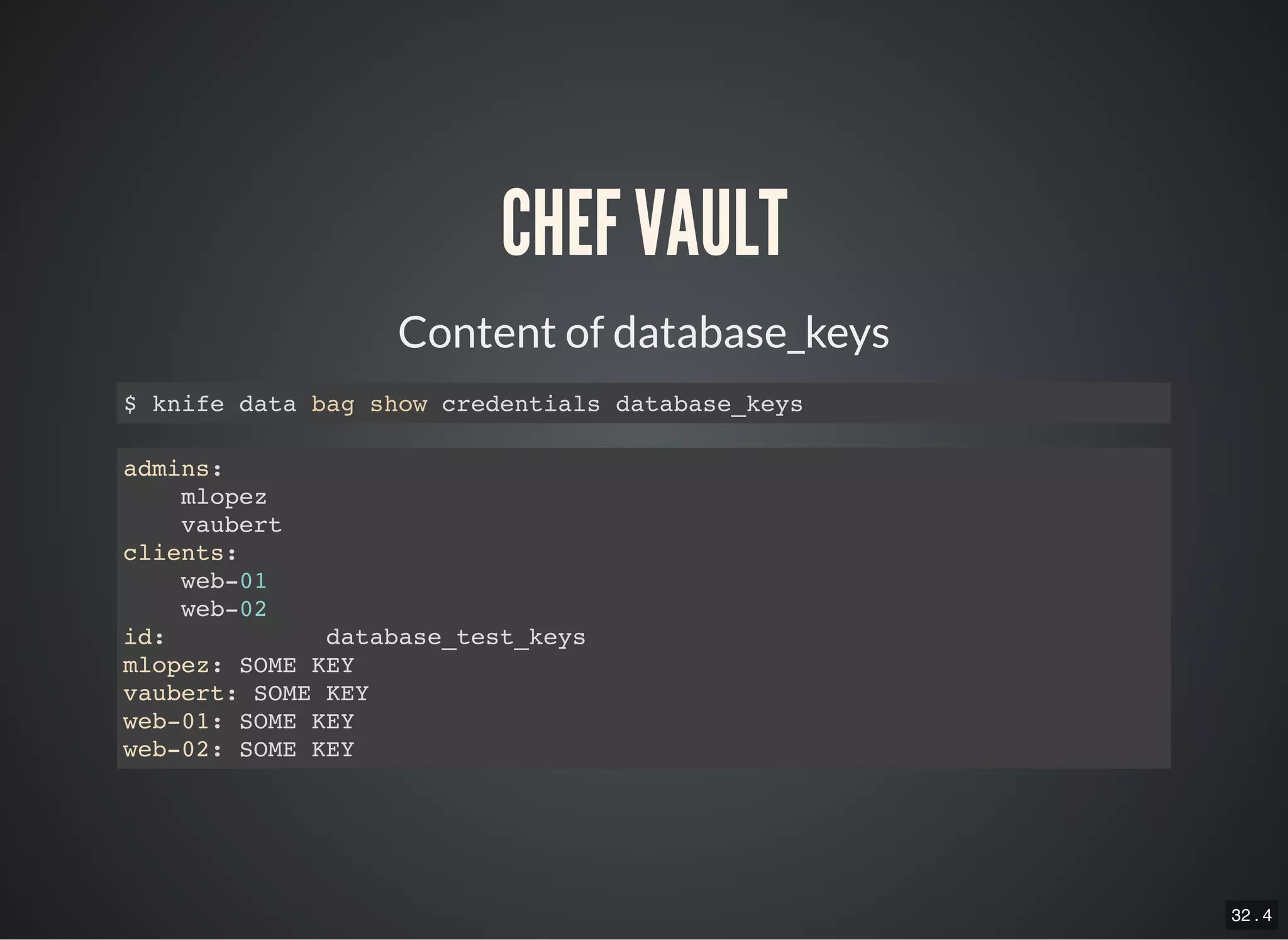

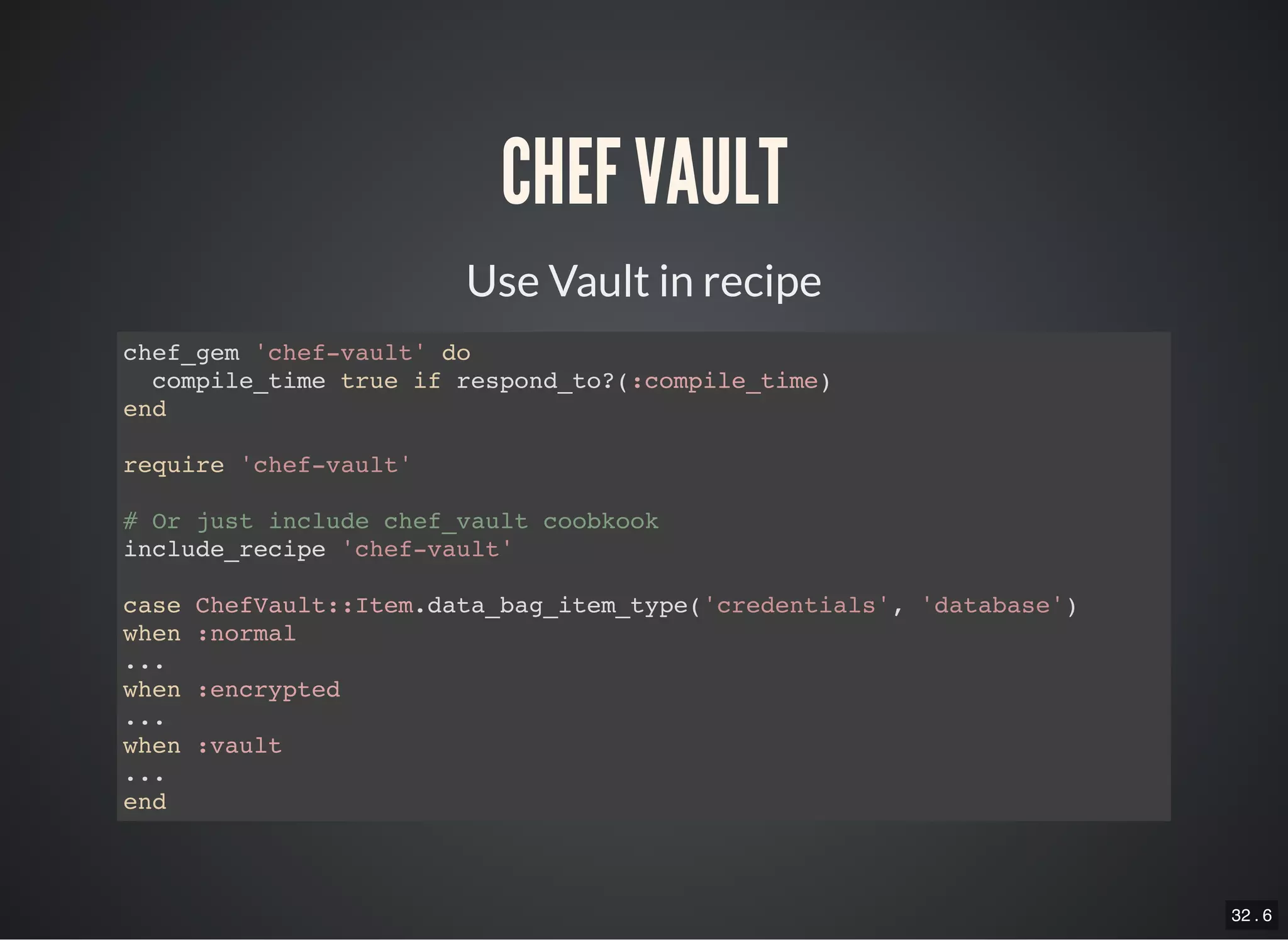
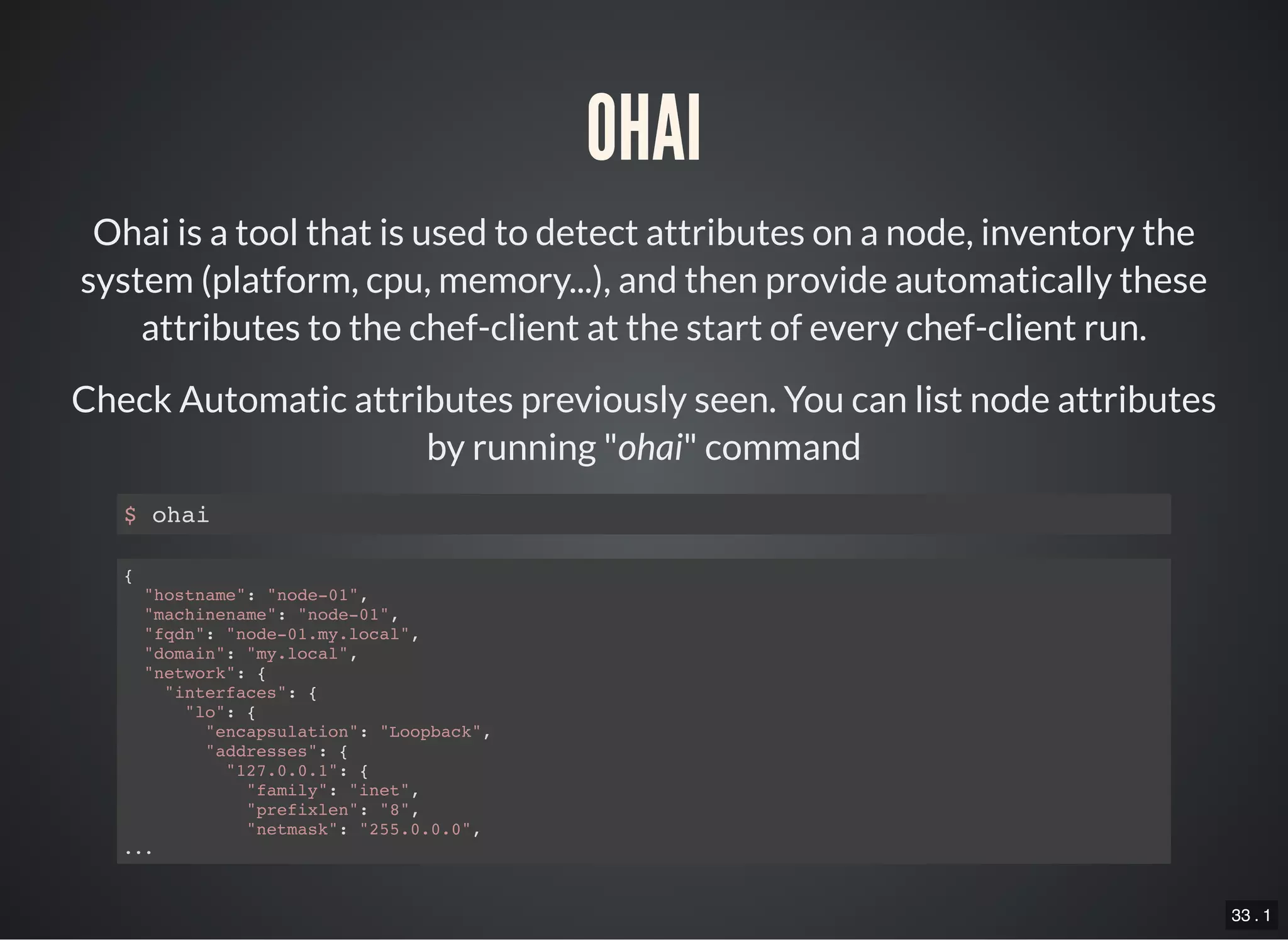
![33 . 2
OHAI - CUSTOM PLUGIN
You can create your own Ohai plugin to collect data before
the run and set them into Ohai as an attribute
Use Ohai cookbook and put your plugin into ' les' directory
› cookbooks/ohai/ les/default/plugins/haproxy.rb
# Encoding: utf-8
# Get current version of Haproxy
Ohai.plugin(:Haproxy) do
provides 'haproxy'
collect_data(:linux) do
haproxy Mash.new
[['dpkg-query -W haproxy | awk '{print $2}' | sed 's/(^[1-9].[1-9]).*/1/'',
:installed_version]].each do |cmd, property|
so = shell_out(cmd)
haproxy[property] = so.stdout.delete("n")
end
end
end](https://image.slidesharecdn.com/chef-industrializeandautomateyourinfrastructure-170207093453/75/Chef-industrialize-and-automate-your-infrastructure-65-2048.jpg)
![34
TEAM WORKING
Git -> Create branches
Test locally before uploading his cookbook
Vagrant / Virtualbox, Kitchen CI...etc.
Chef solo/zero/local
Bump version of your cookbook and upload it into environment
Freeze uploaded version and apply version constraint into environnements
Knife Spork – Plugin allow you to bump, upload and promote a cookbook more easily.
Noti cation plugin, auto git add …
$ knife cookbook upload nginx [--freeze] [--force] [-E <environment>]
$ knife spork omni nginx –l minor –e qa_group</environment>](https://image.slidesharecdn.com/chef-industrializeandautomateyourinfrastructure-170207093453/75/Chef-industrialize-and-automate-your-infrastructure-66-2048.jpg)
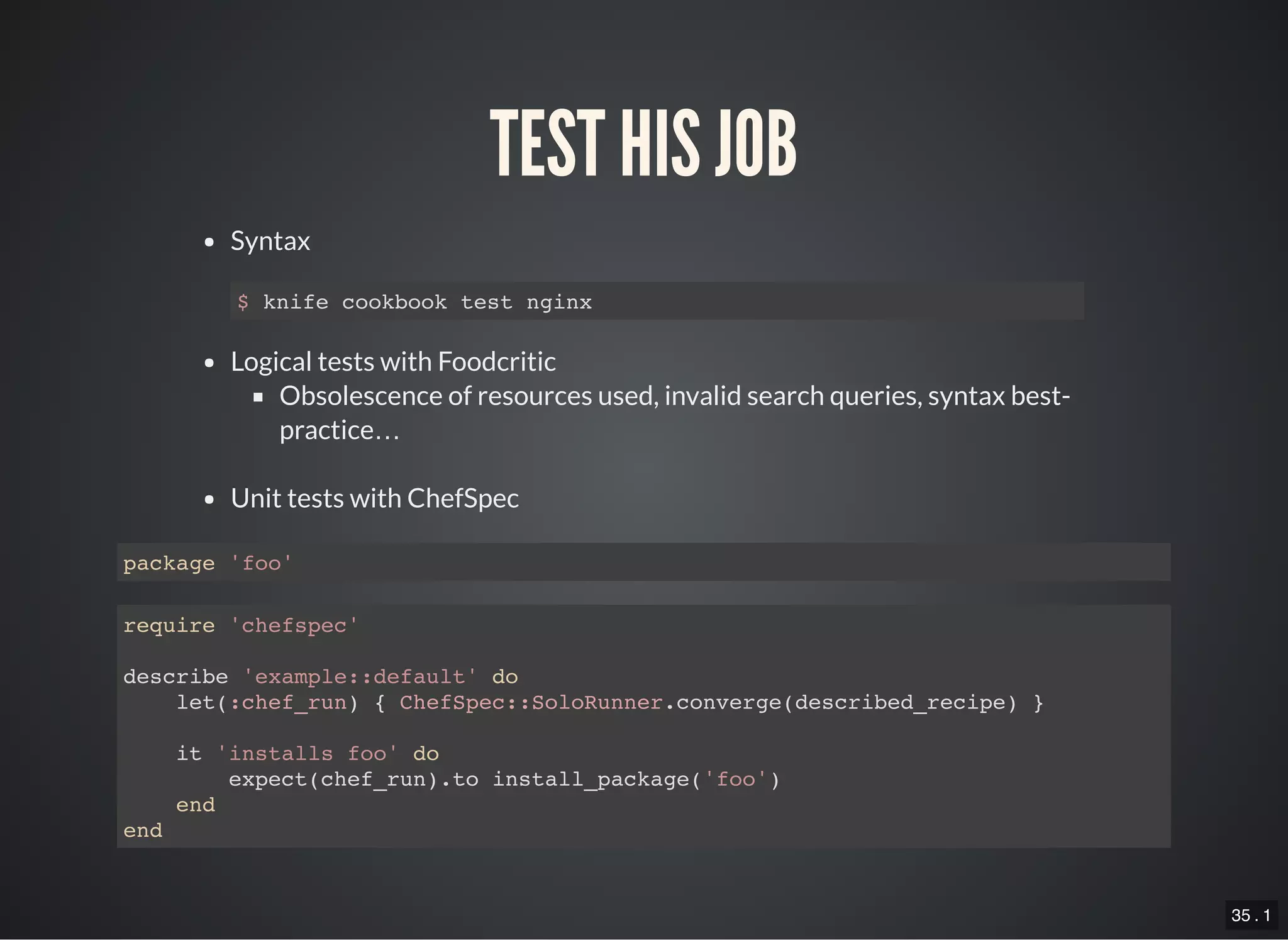
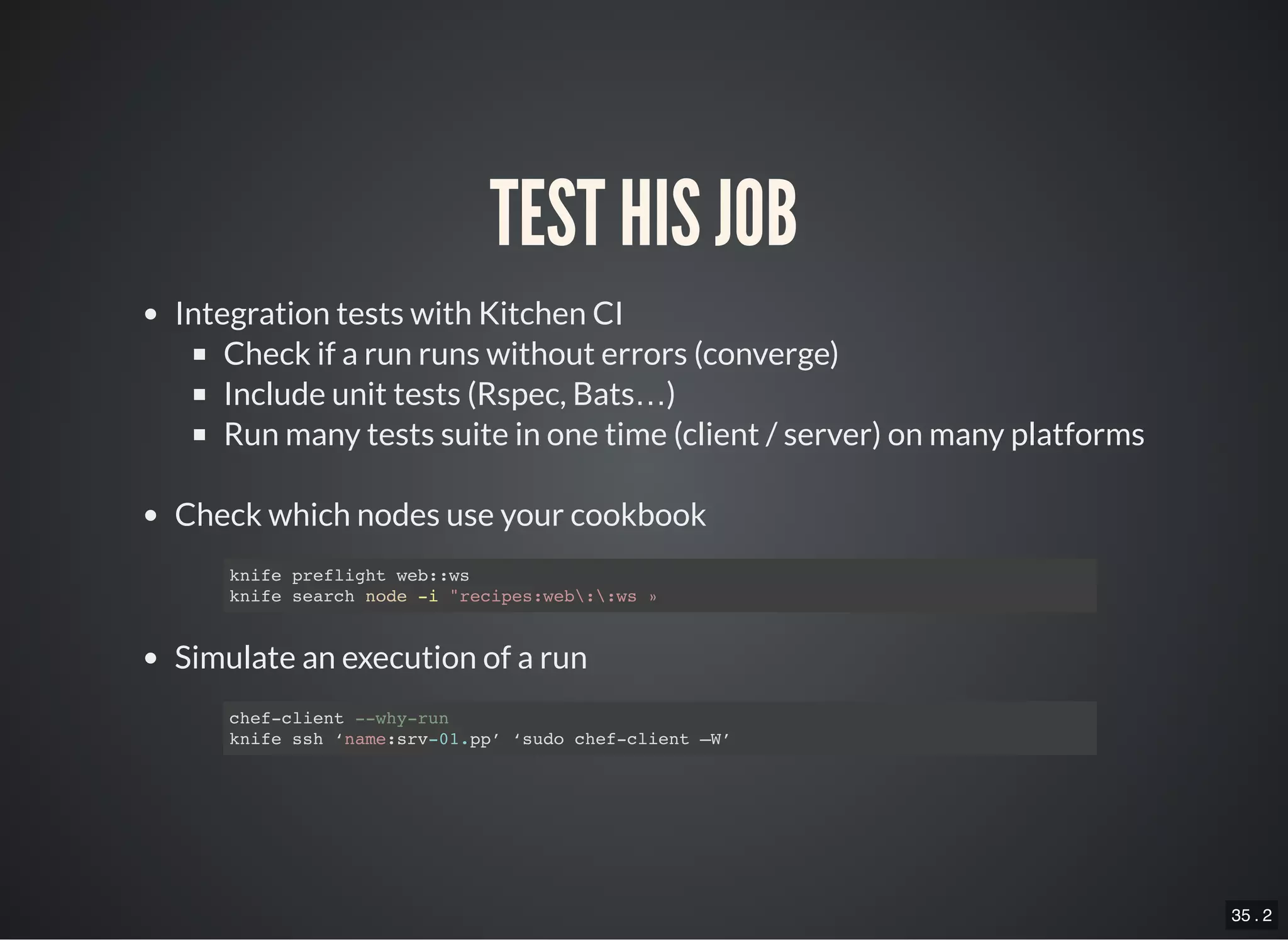
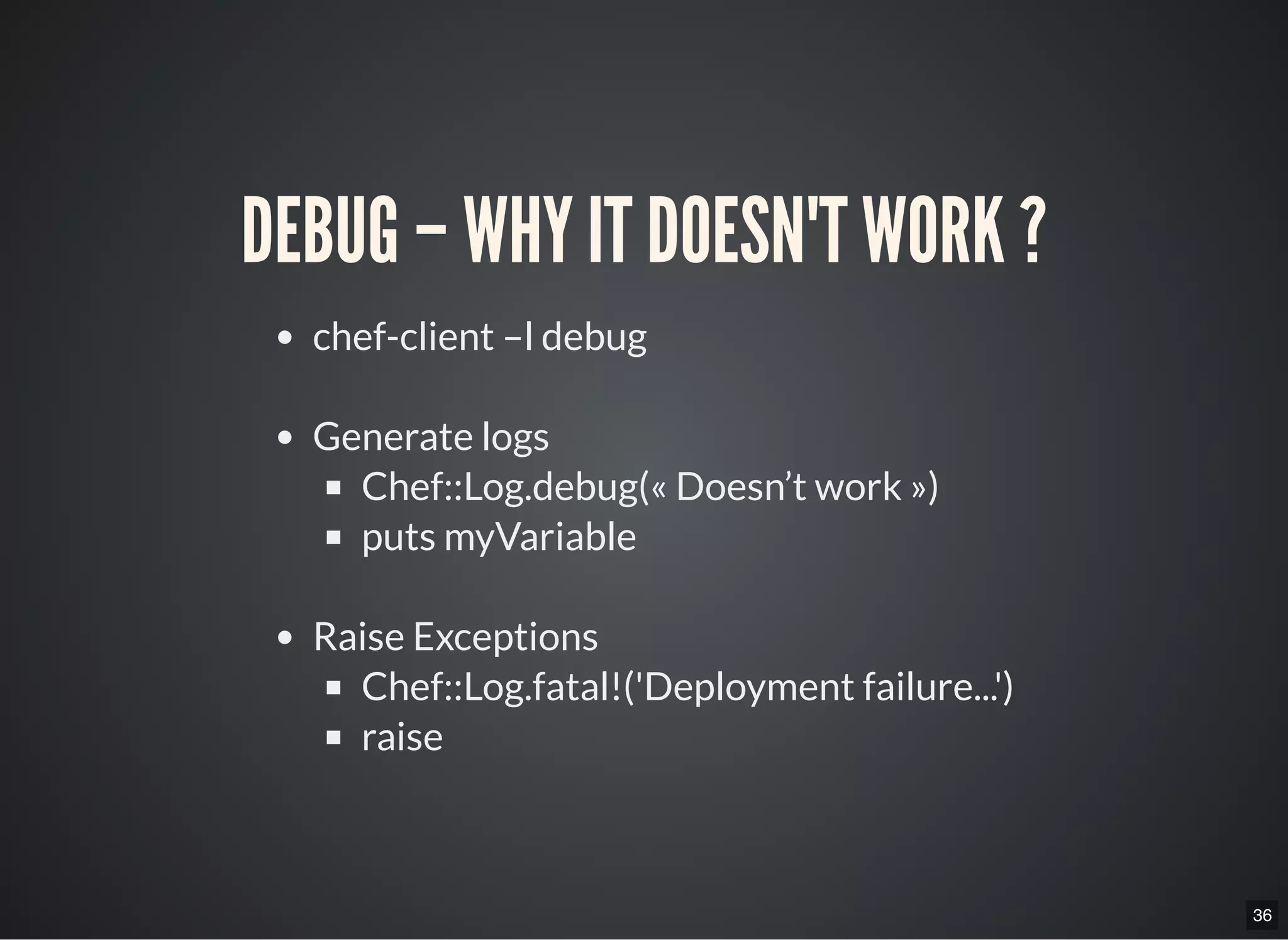
![37 . 1
ADVANCED
Override a run-list (-o "recipe[]")
Override a community Cookbook
knife ssh 'name:srv-01.dev' 'sudo chef-client –o "recipe[firefox]"'
include_recipe 'nginx'
resources("template[/etc/nginx/nginx.conf]").cookbook 'myNginx')](https://image.slidesharecdn.com/chef-industrializeandautomateyourinfrastructure-170207093453/75/Chef-industrialize-and-automate-your-infrastructure-70-2048.jpg)
